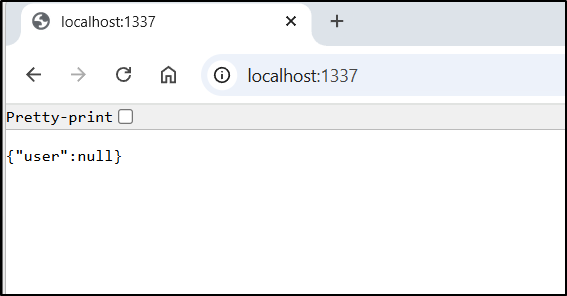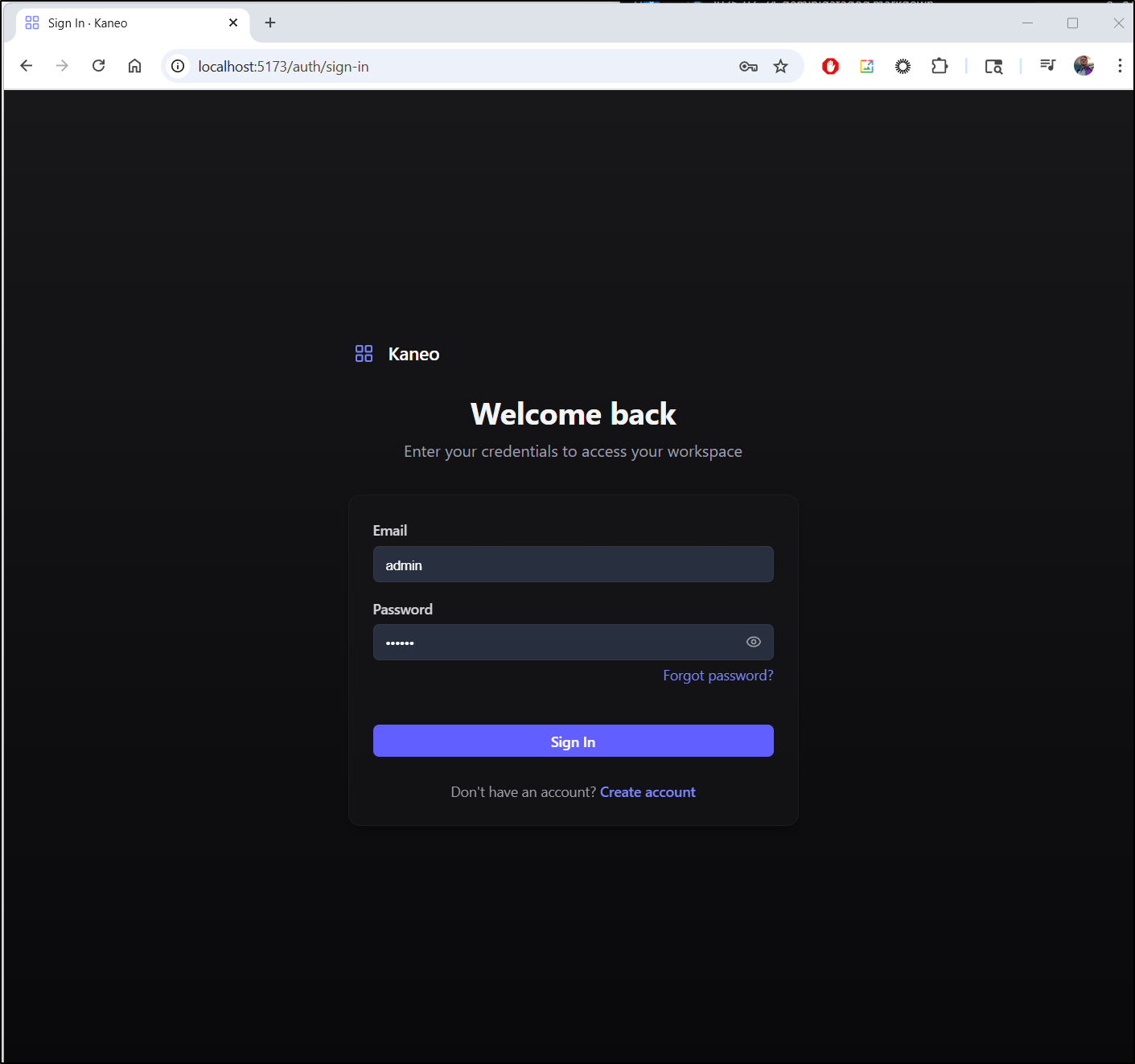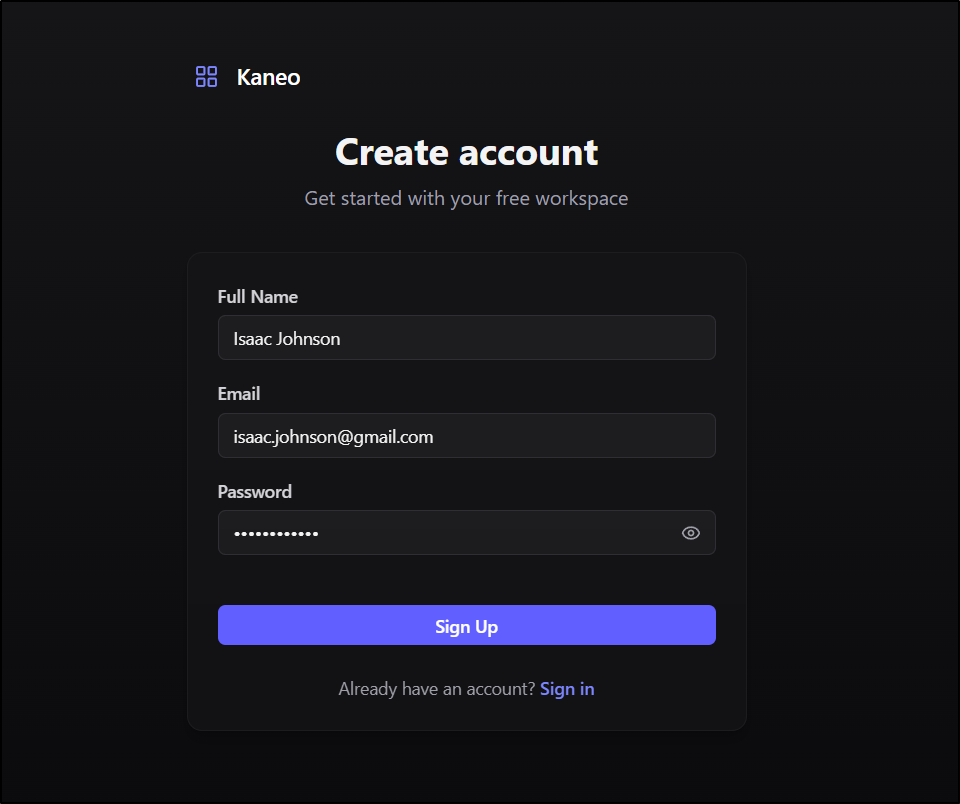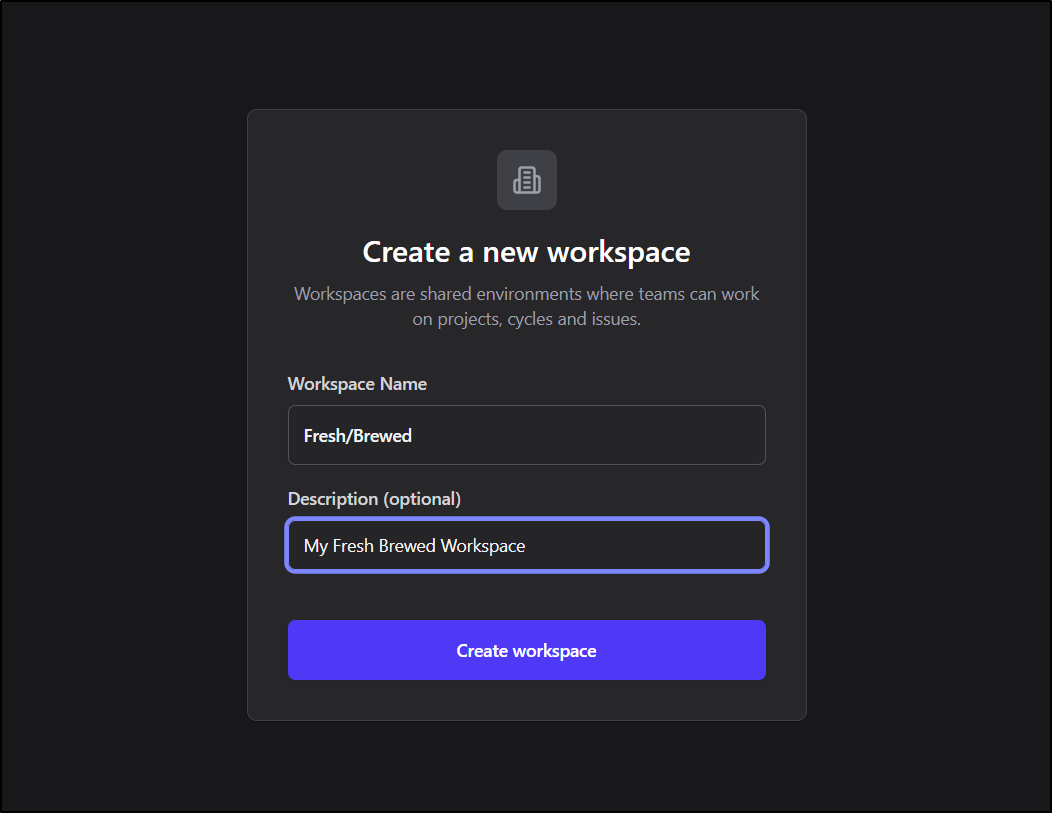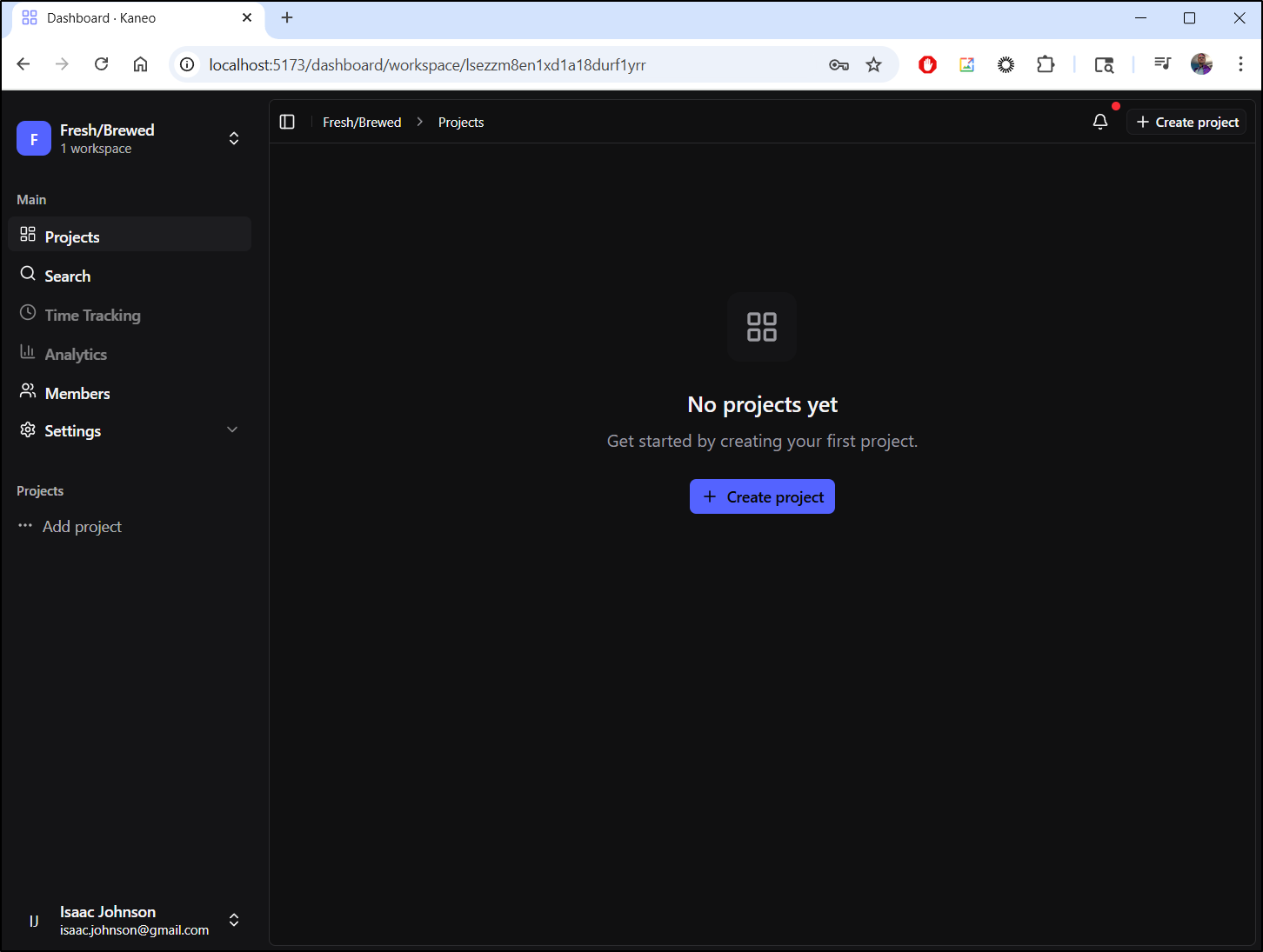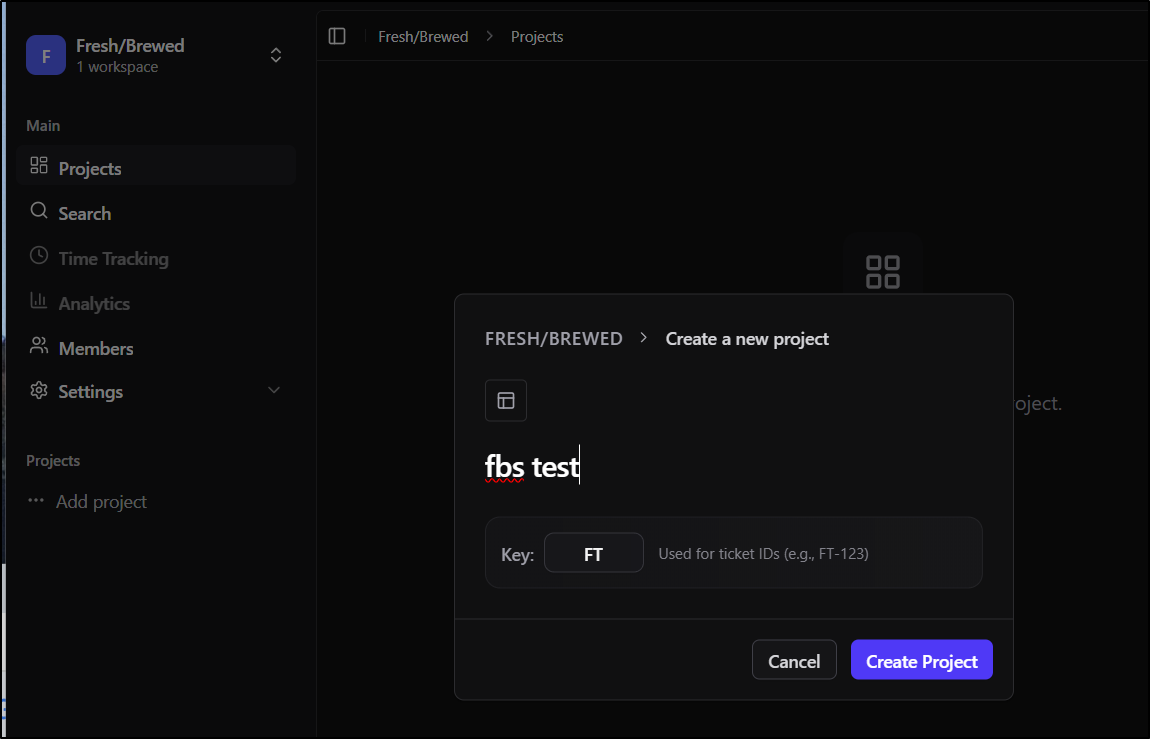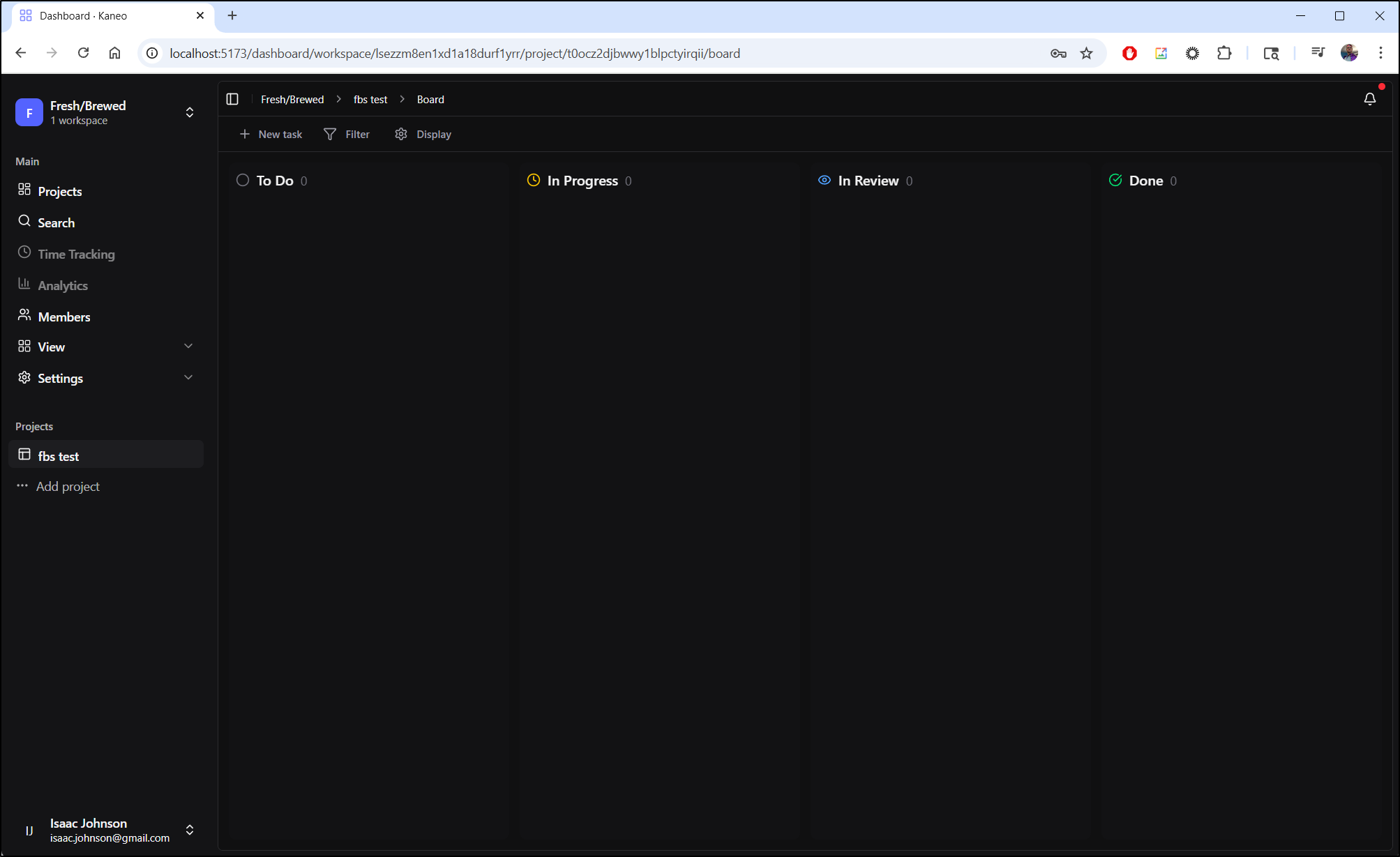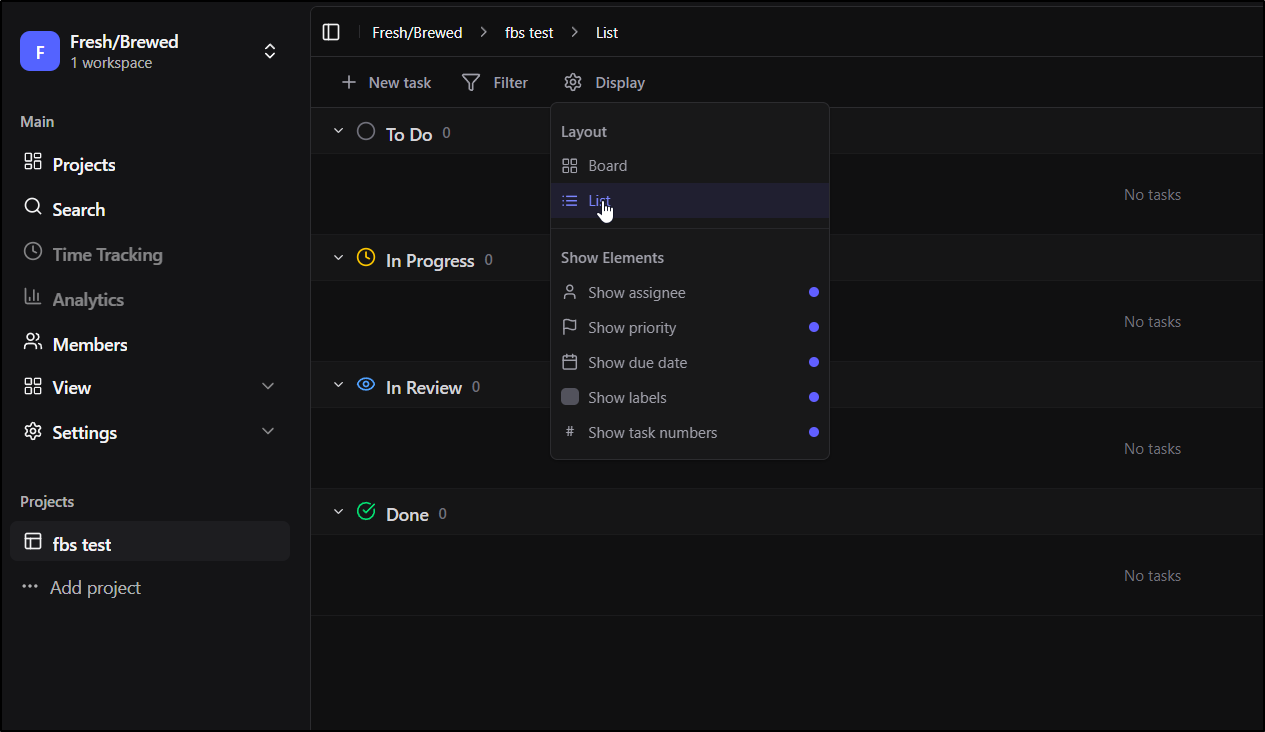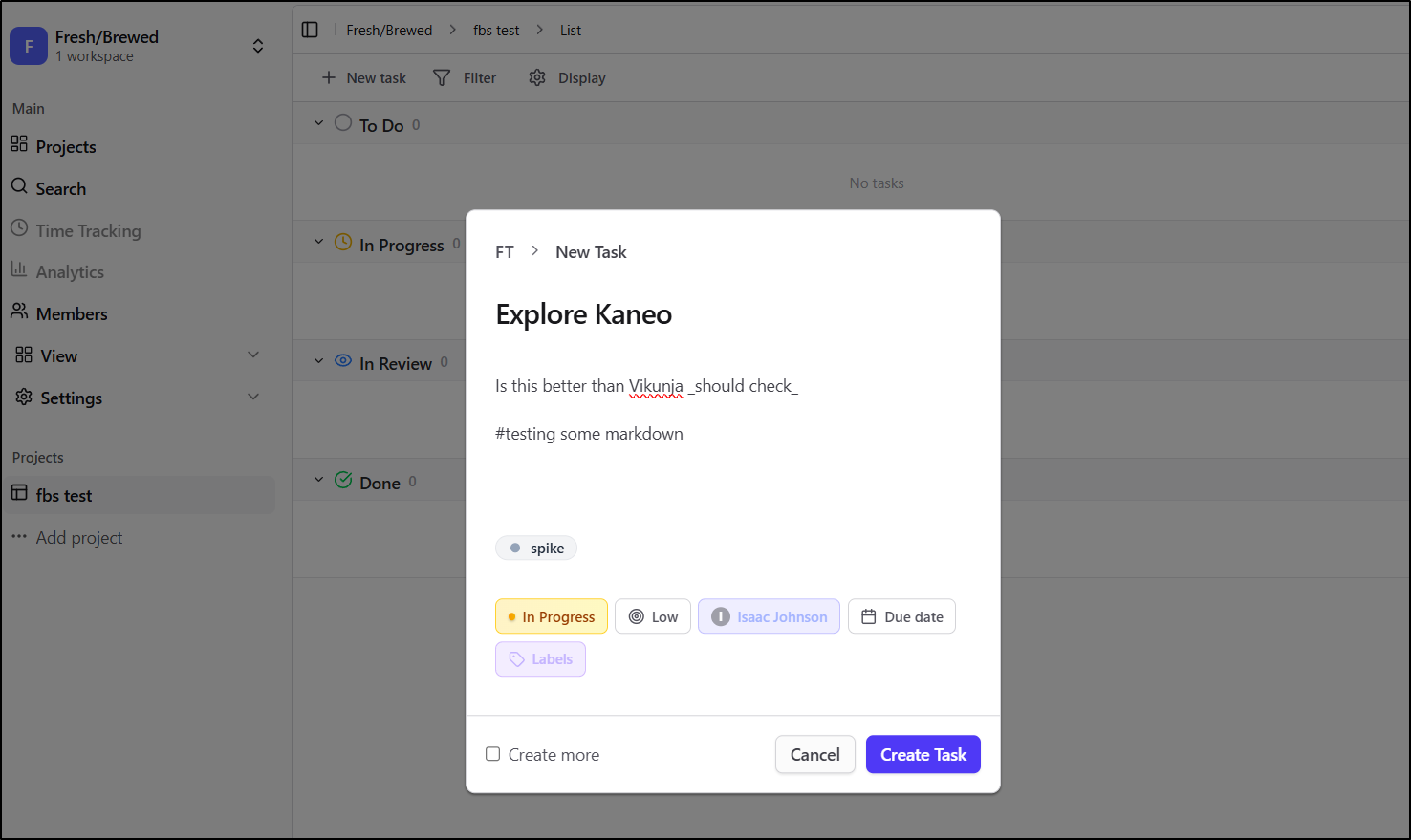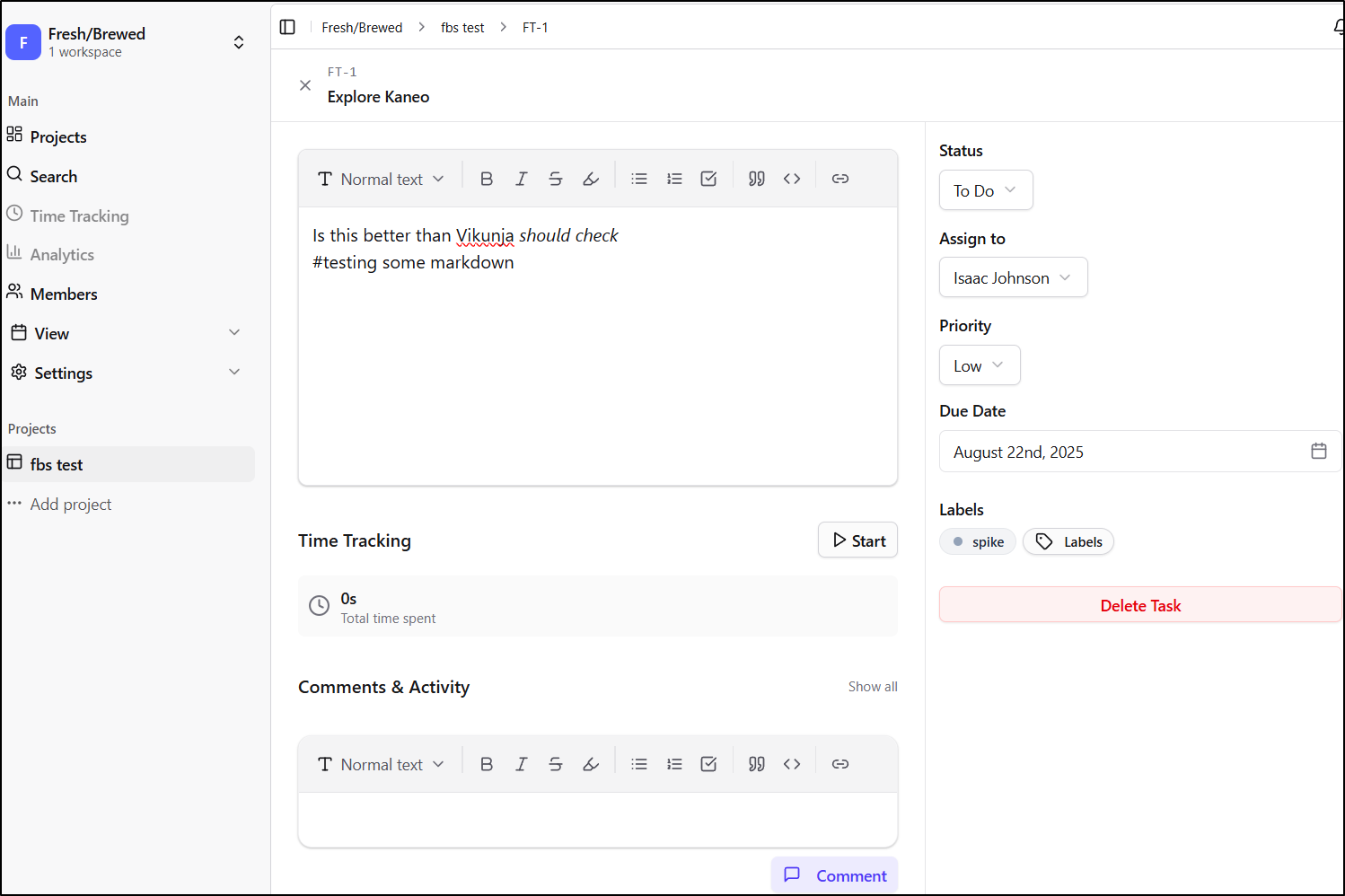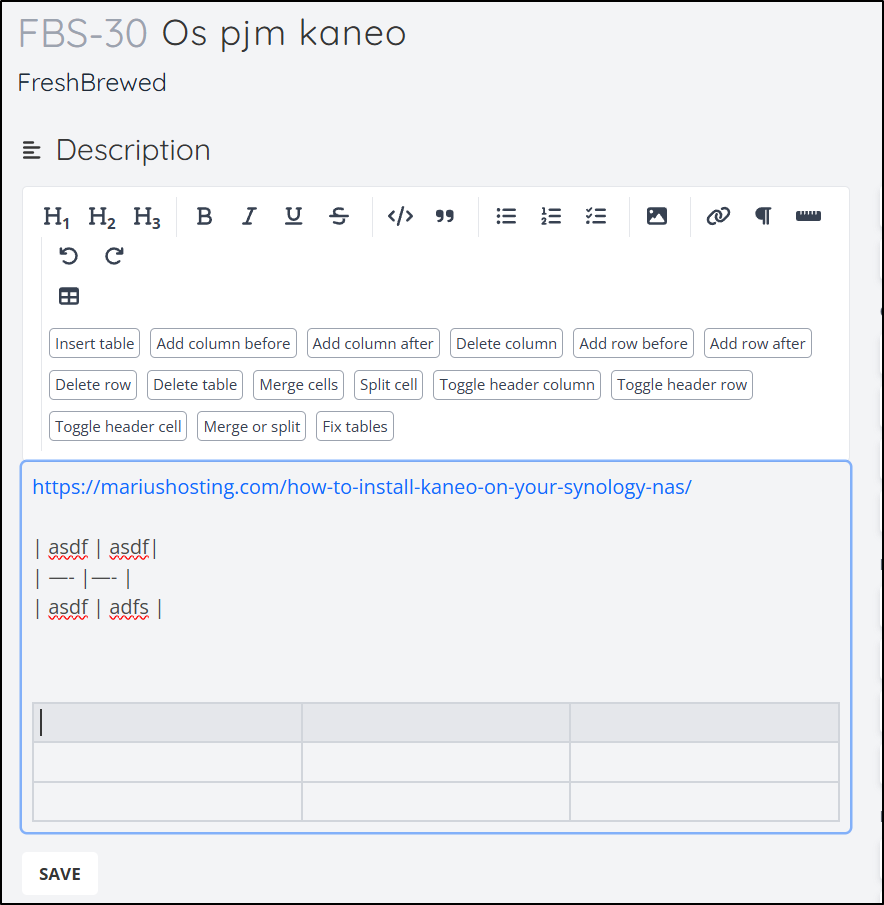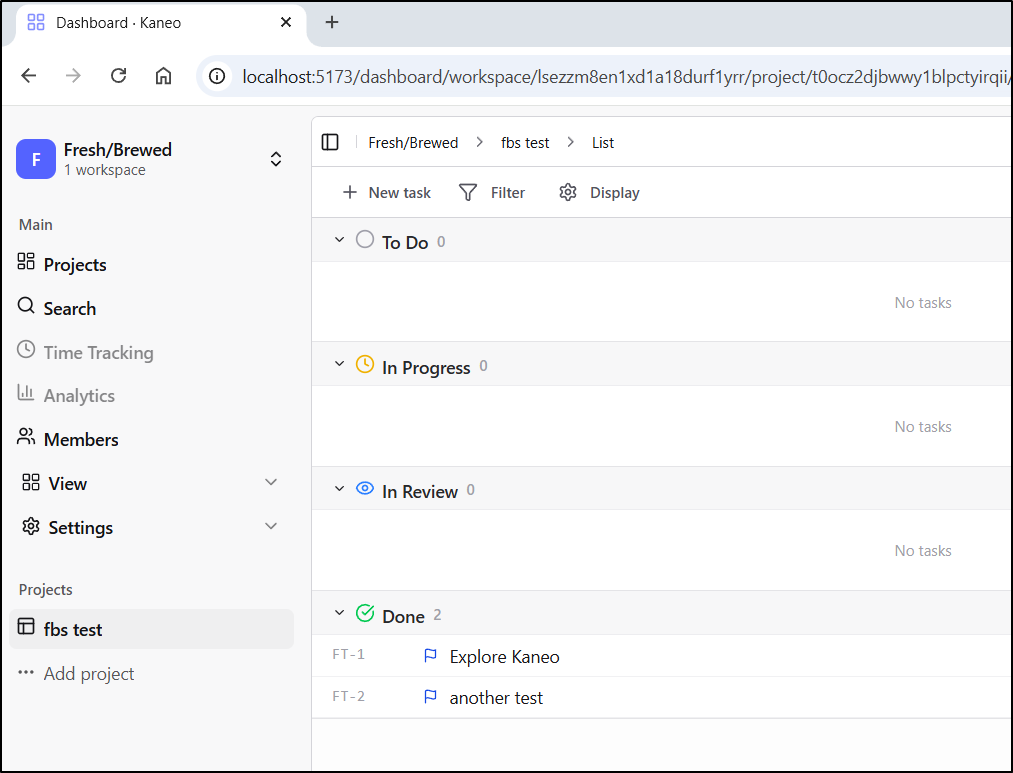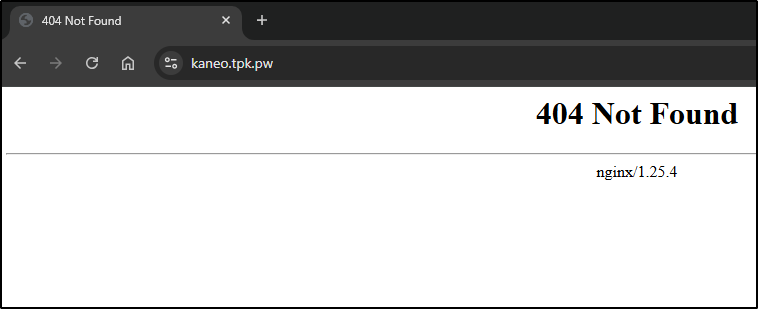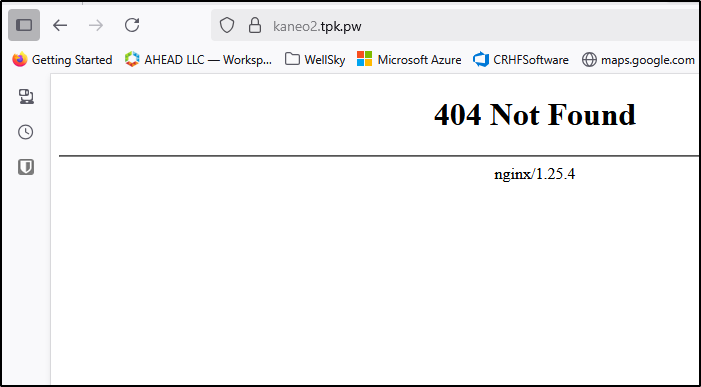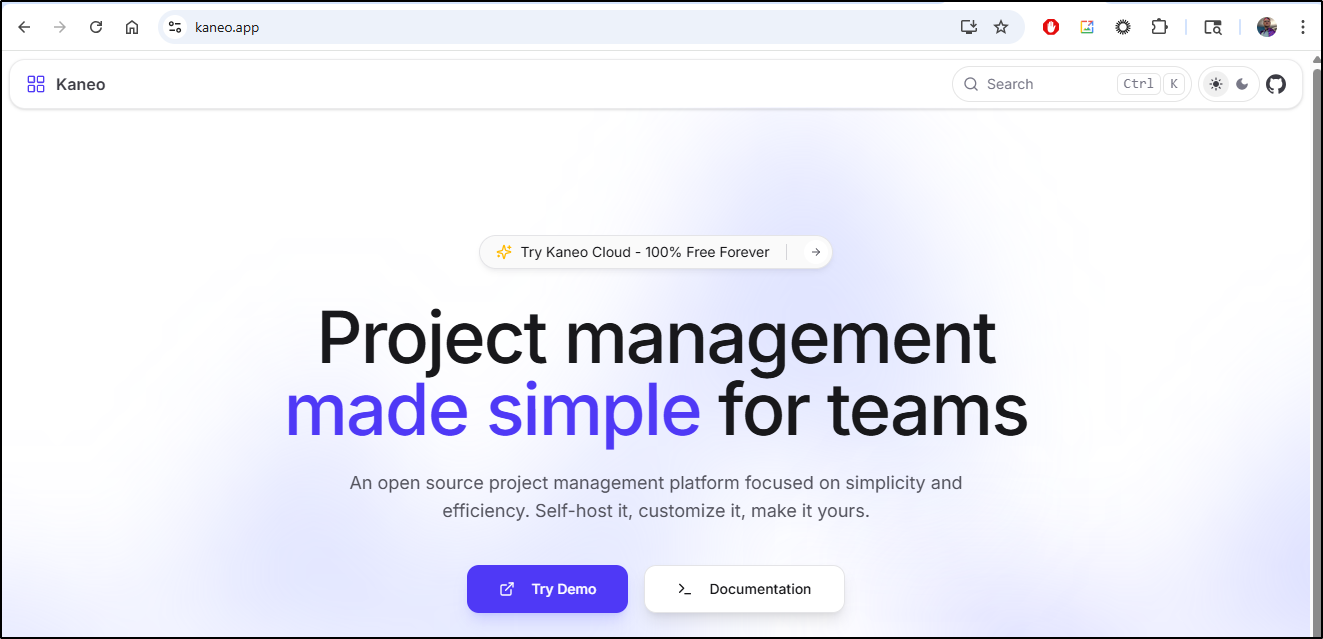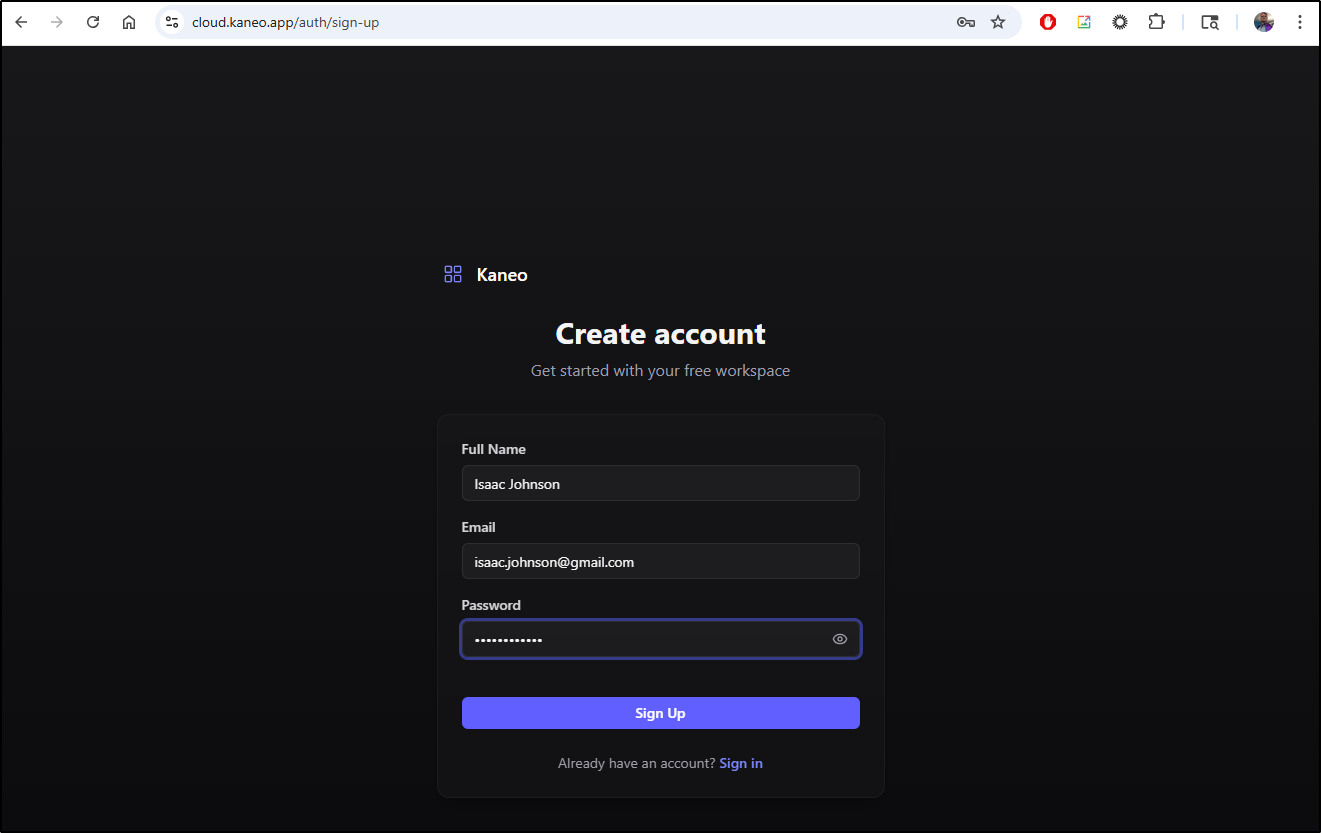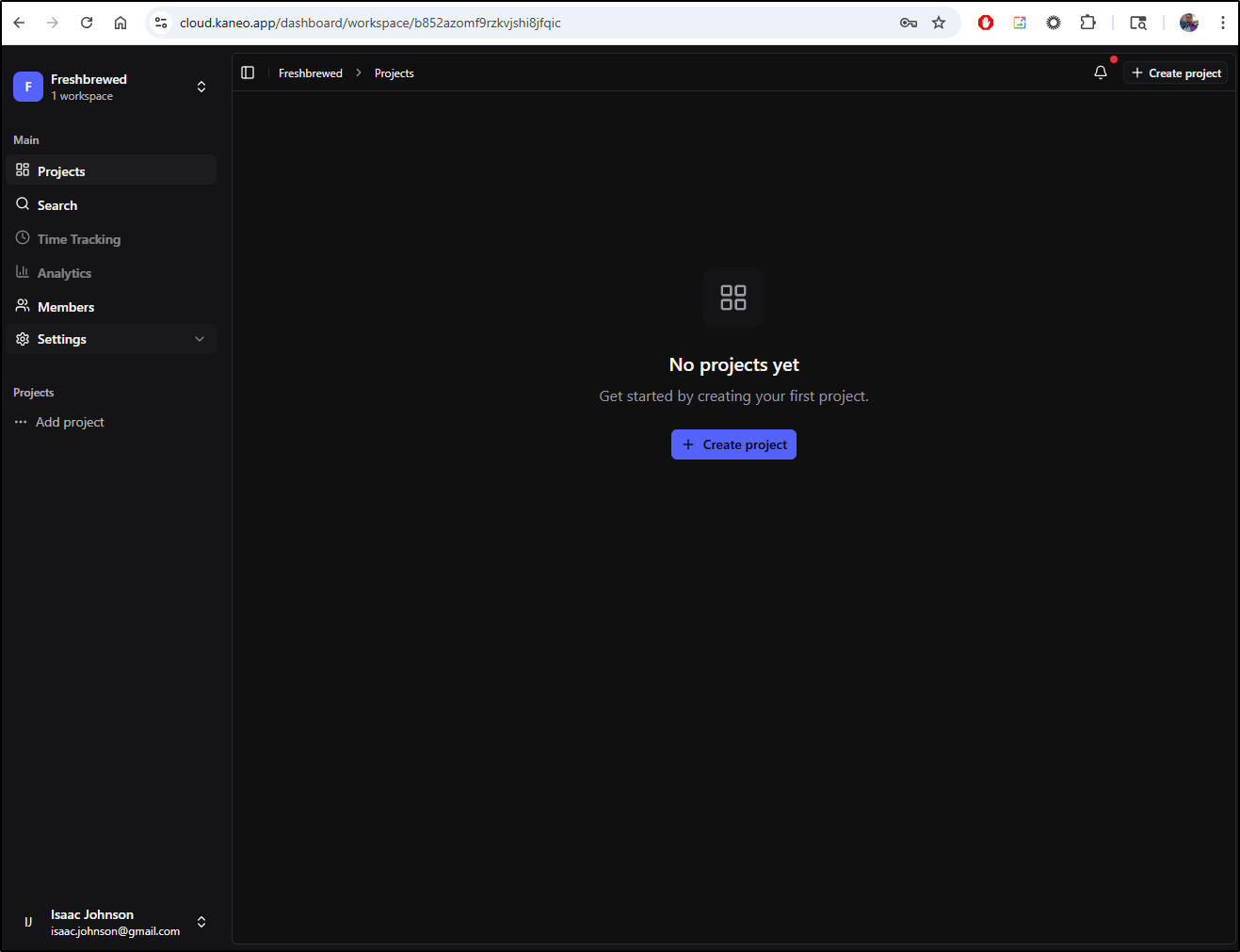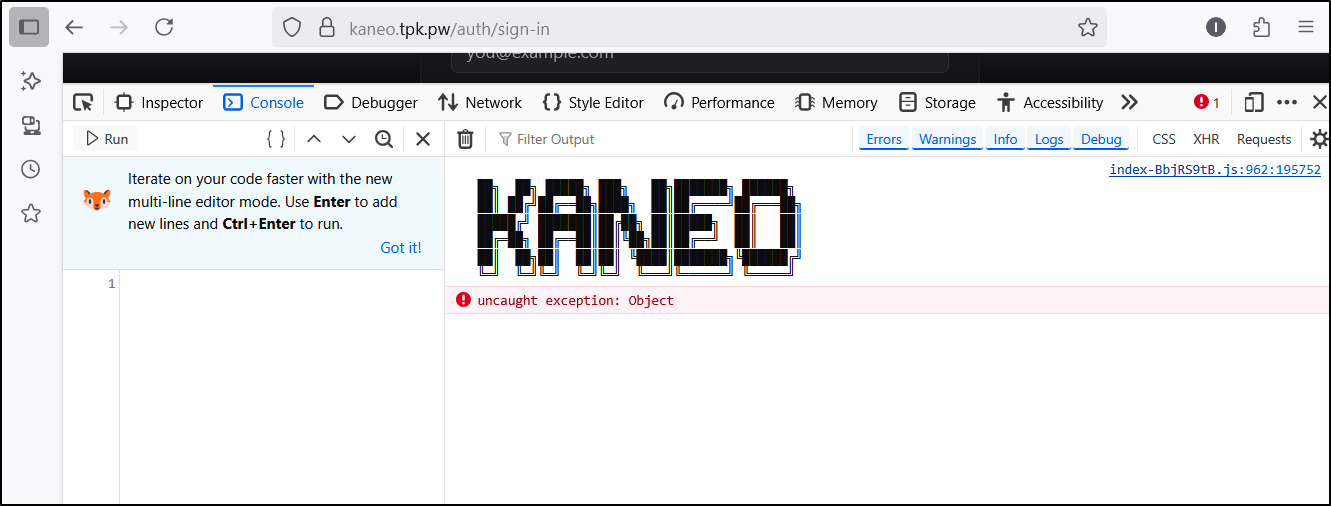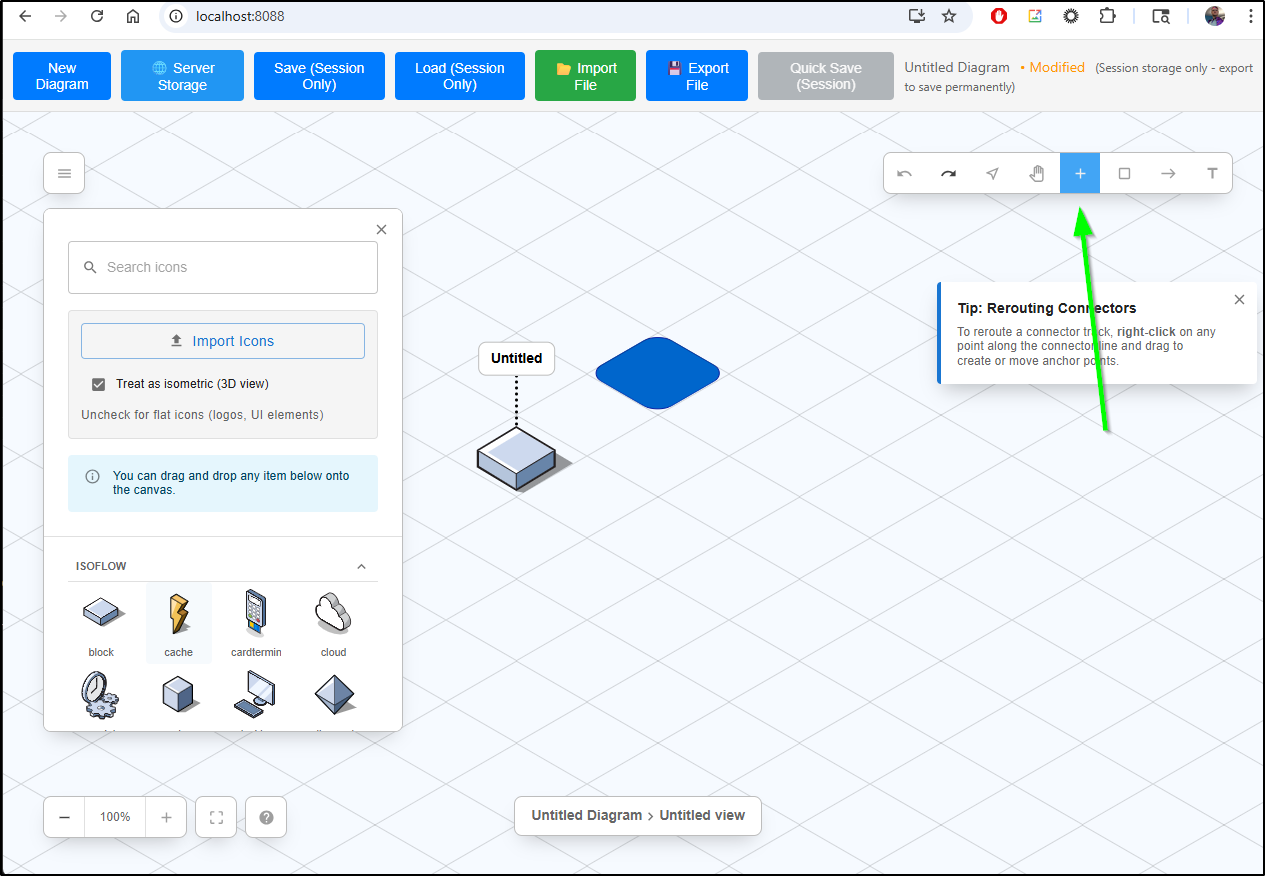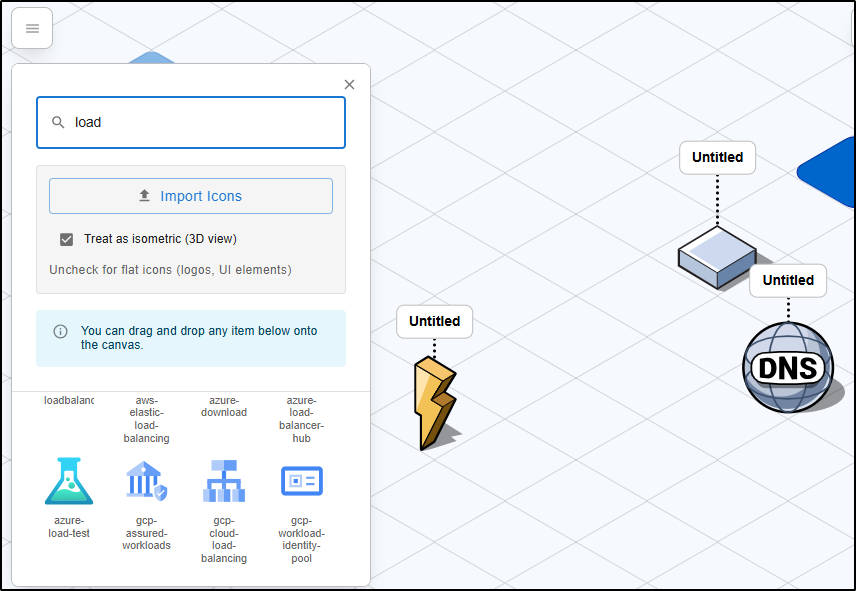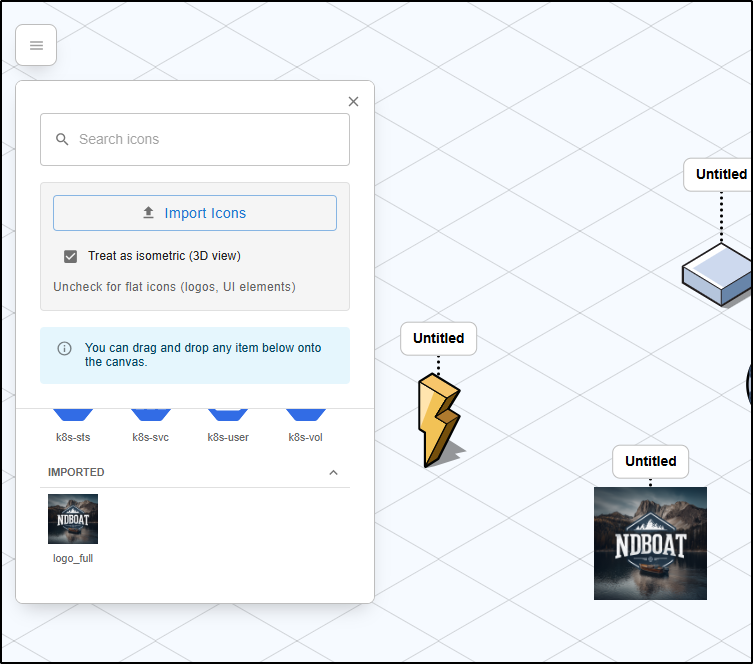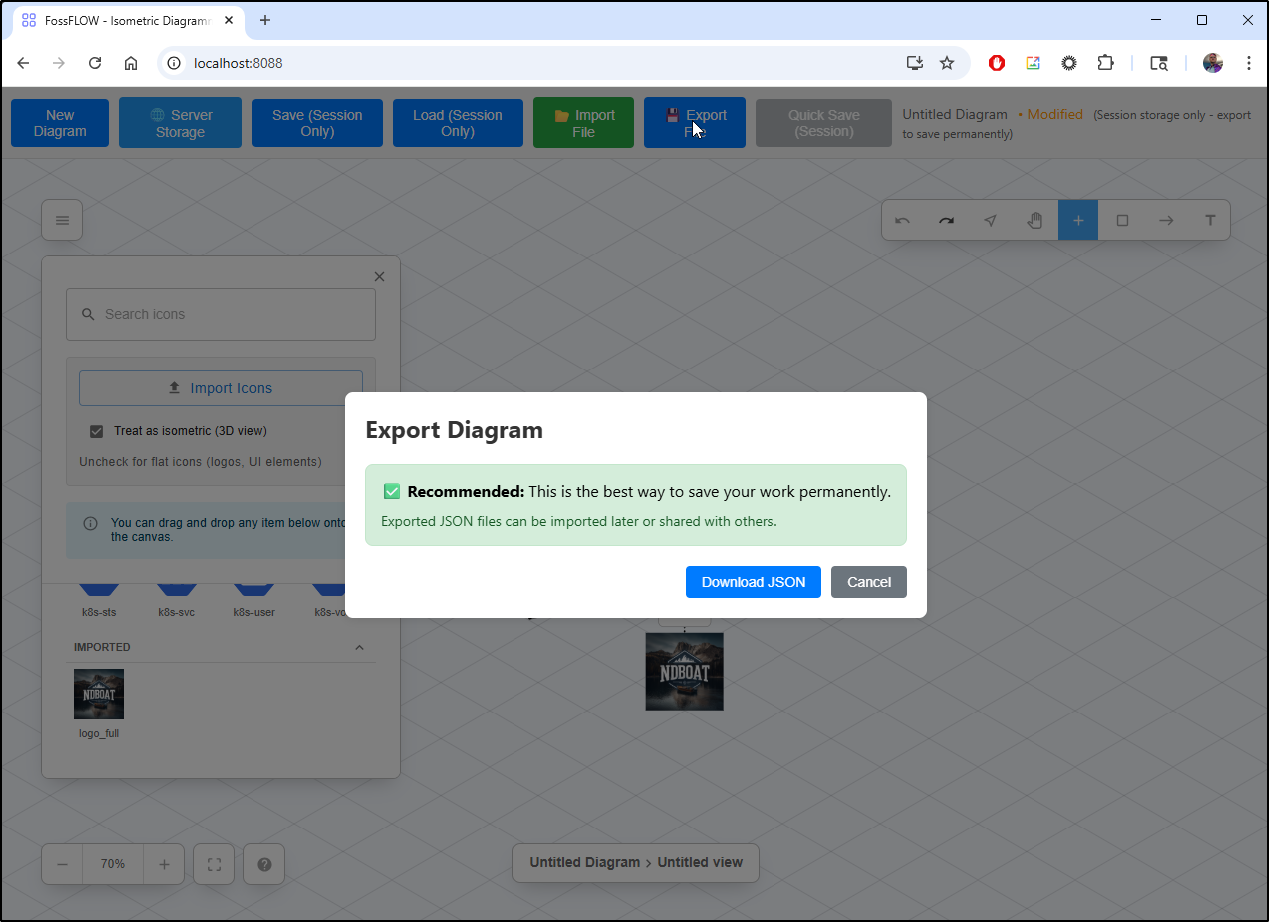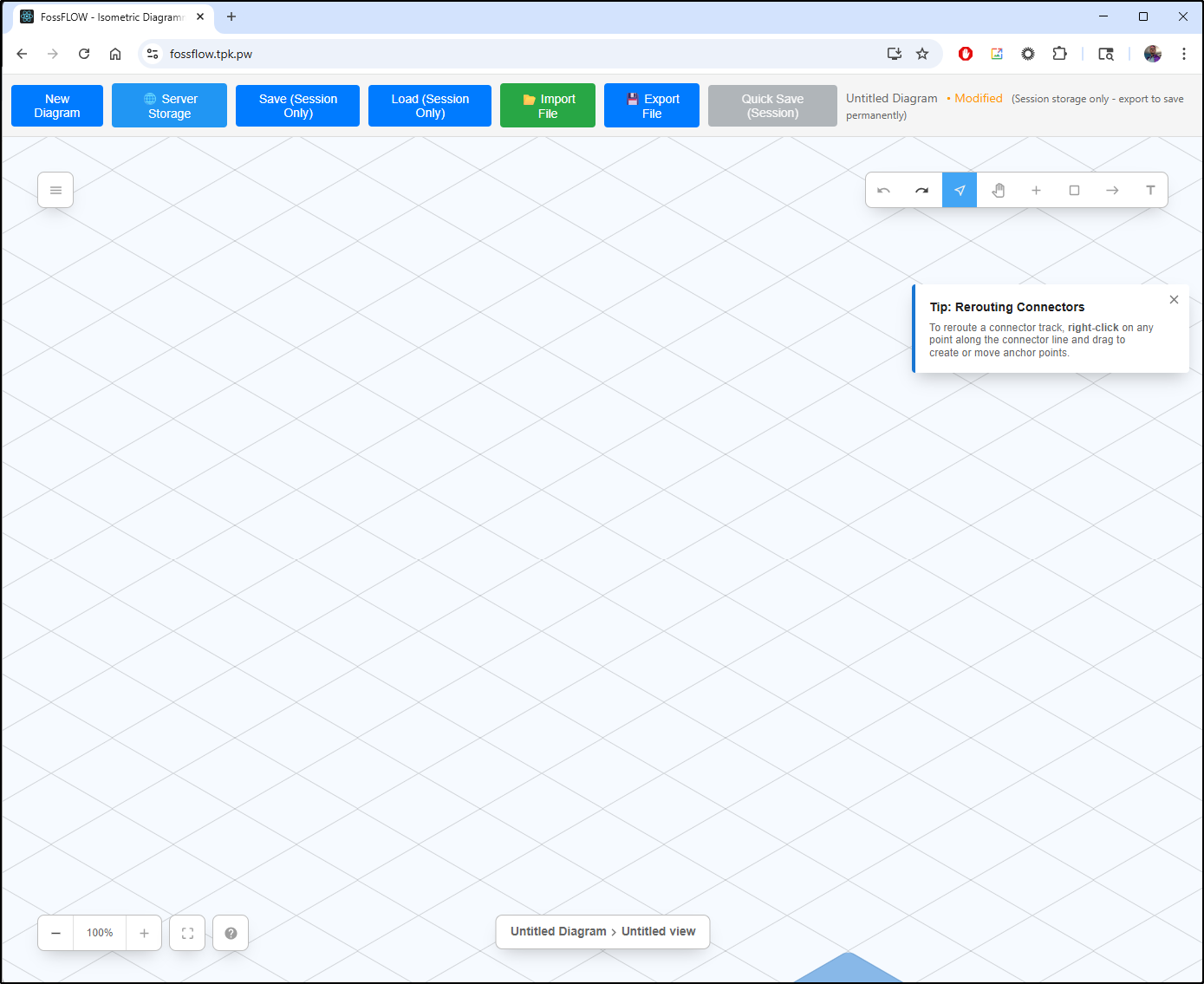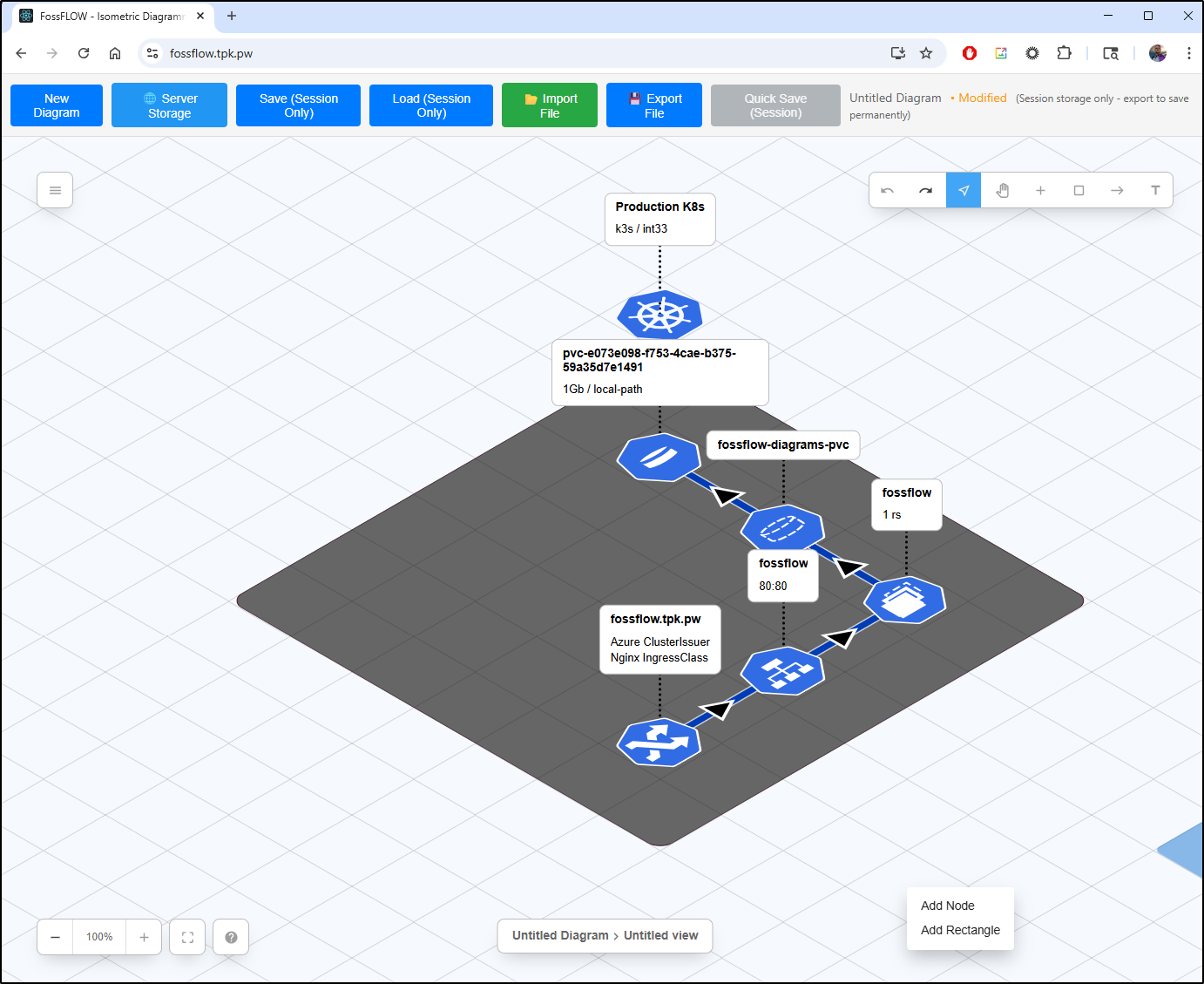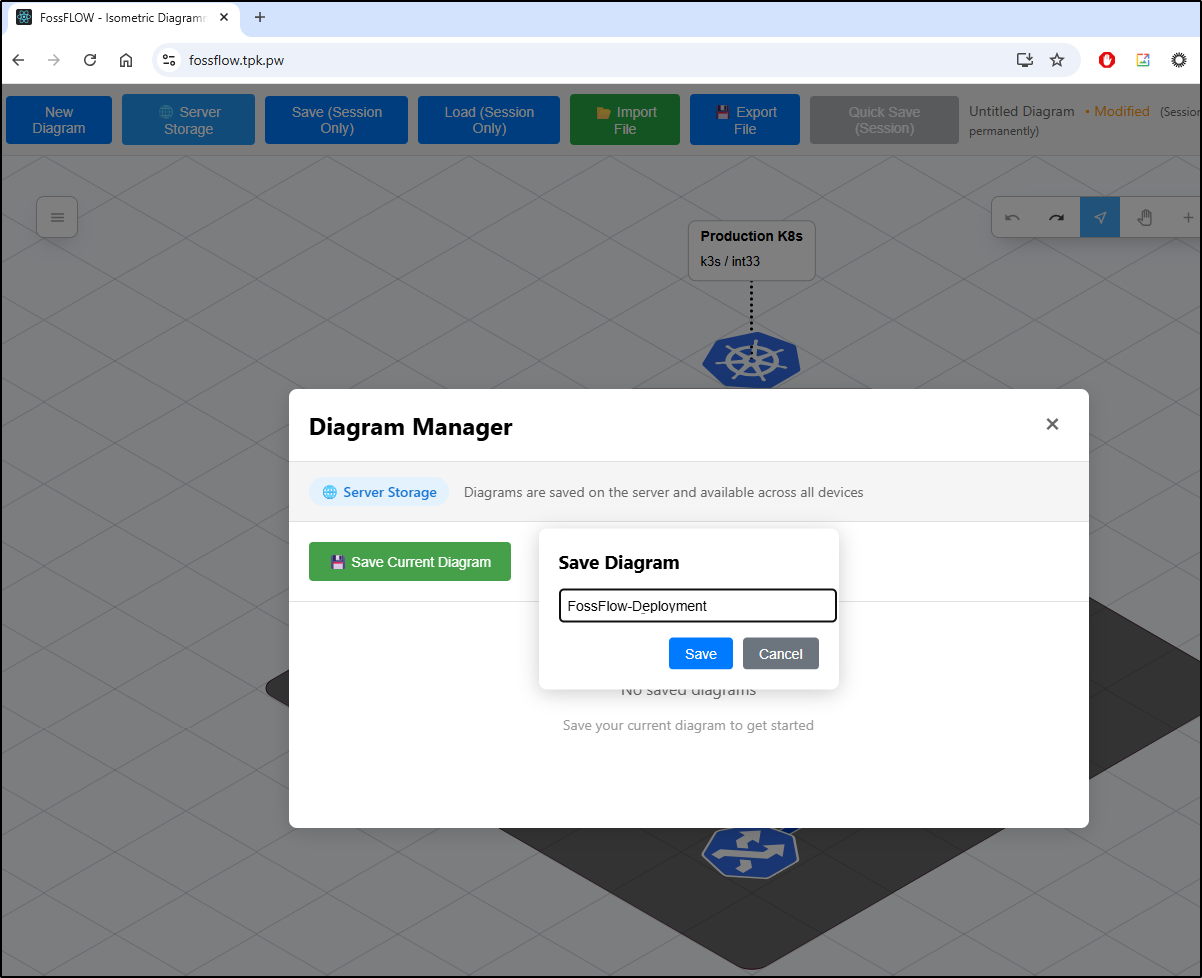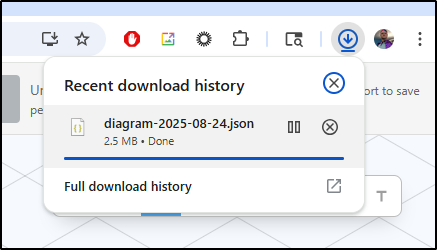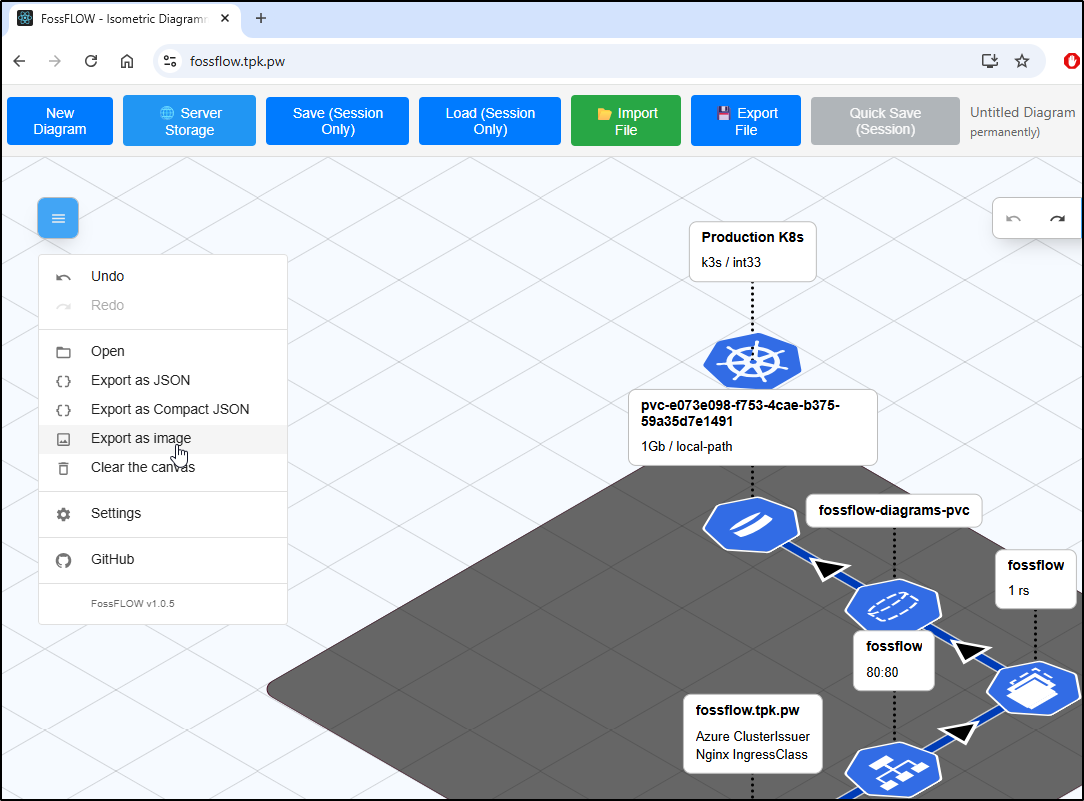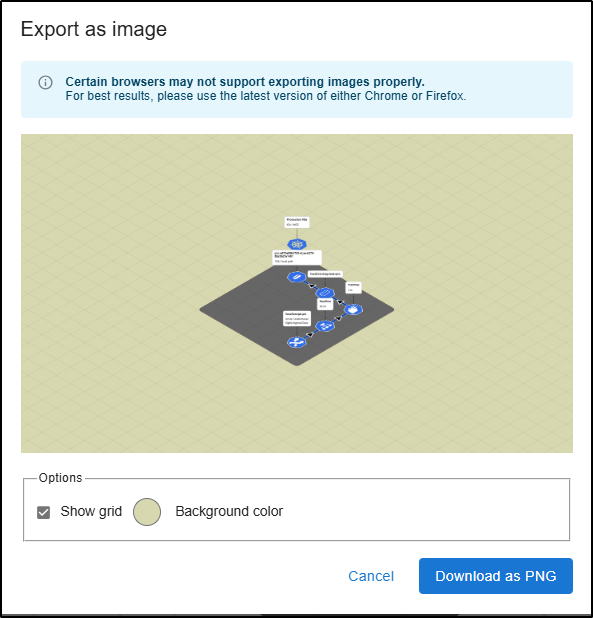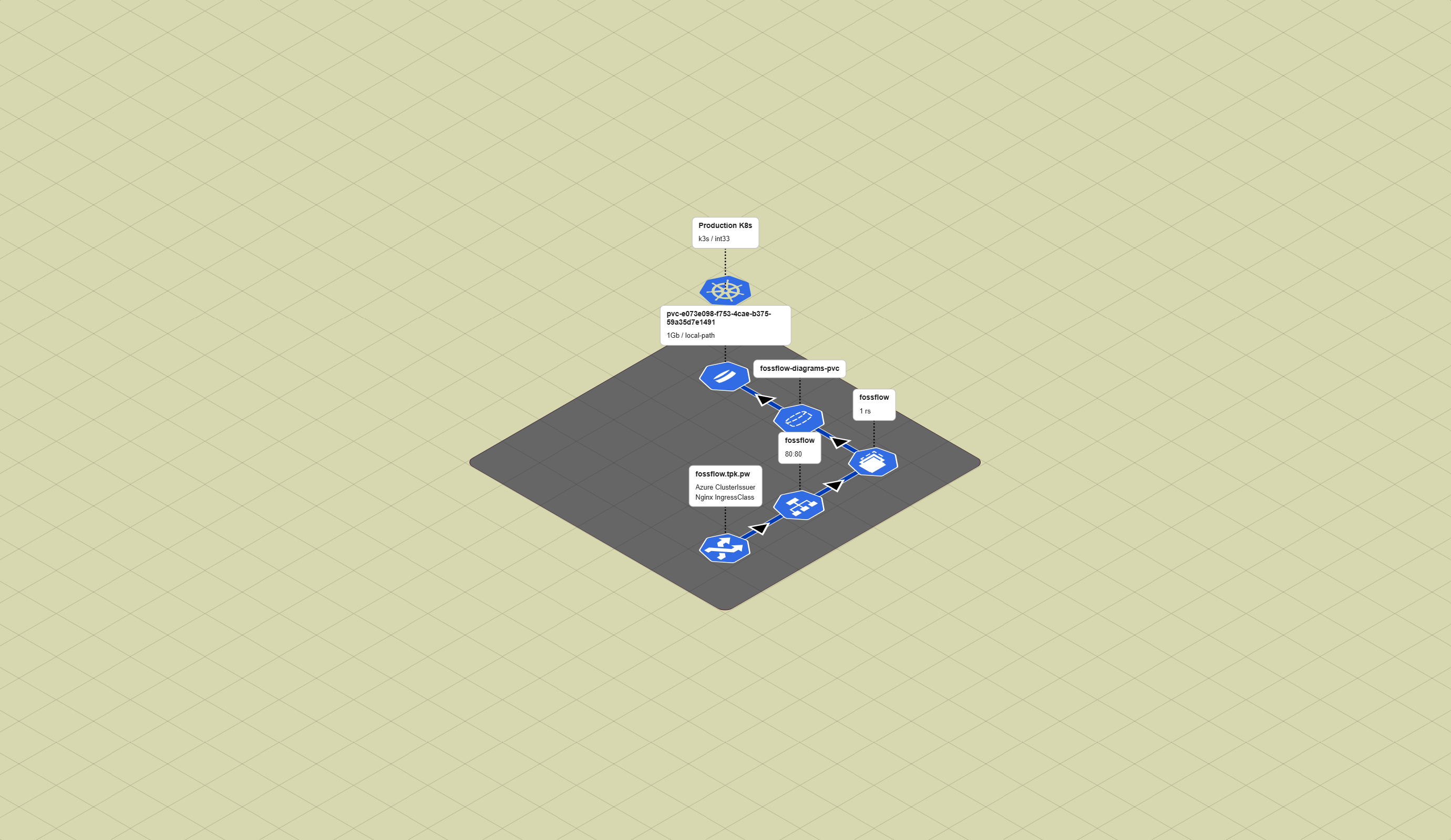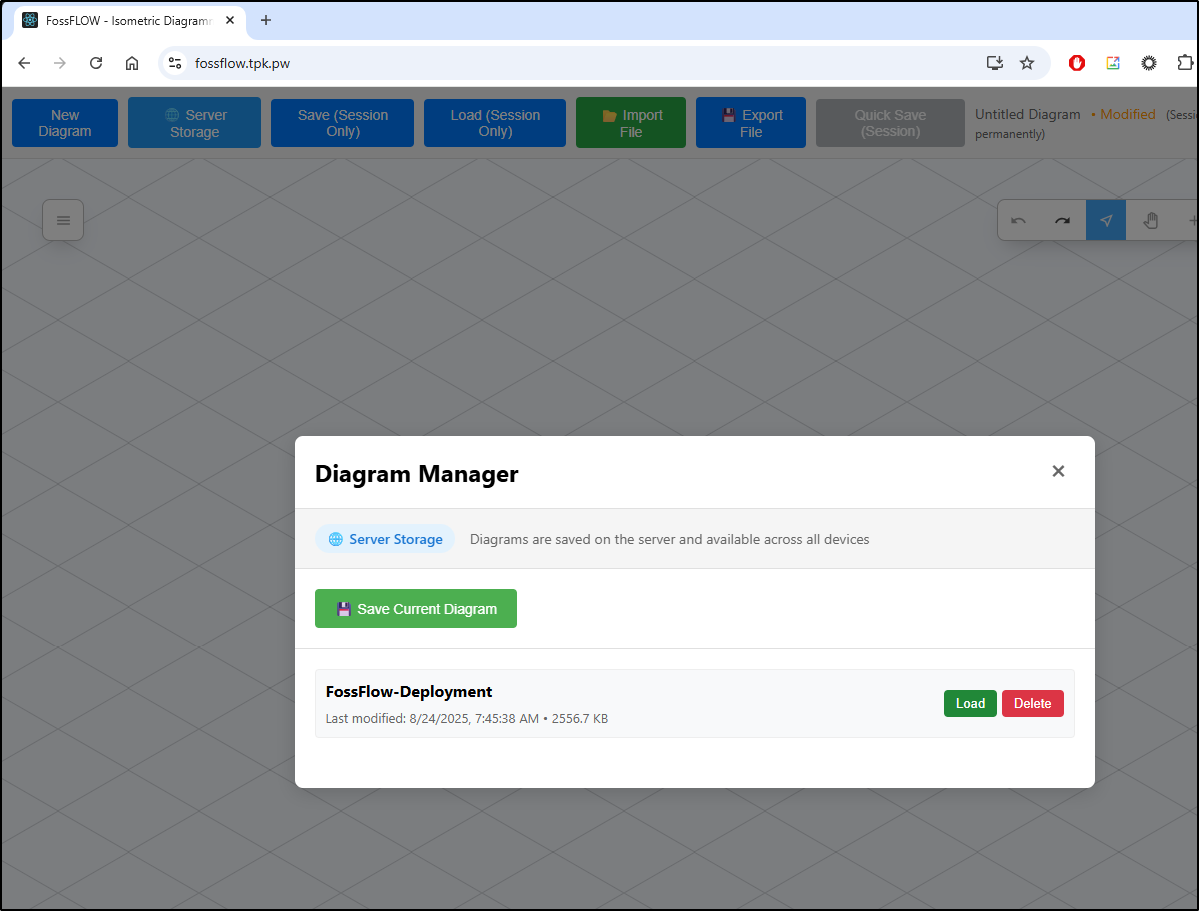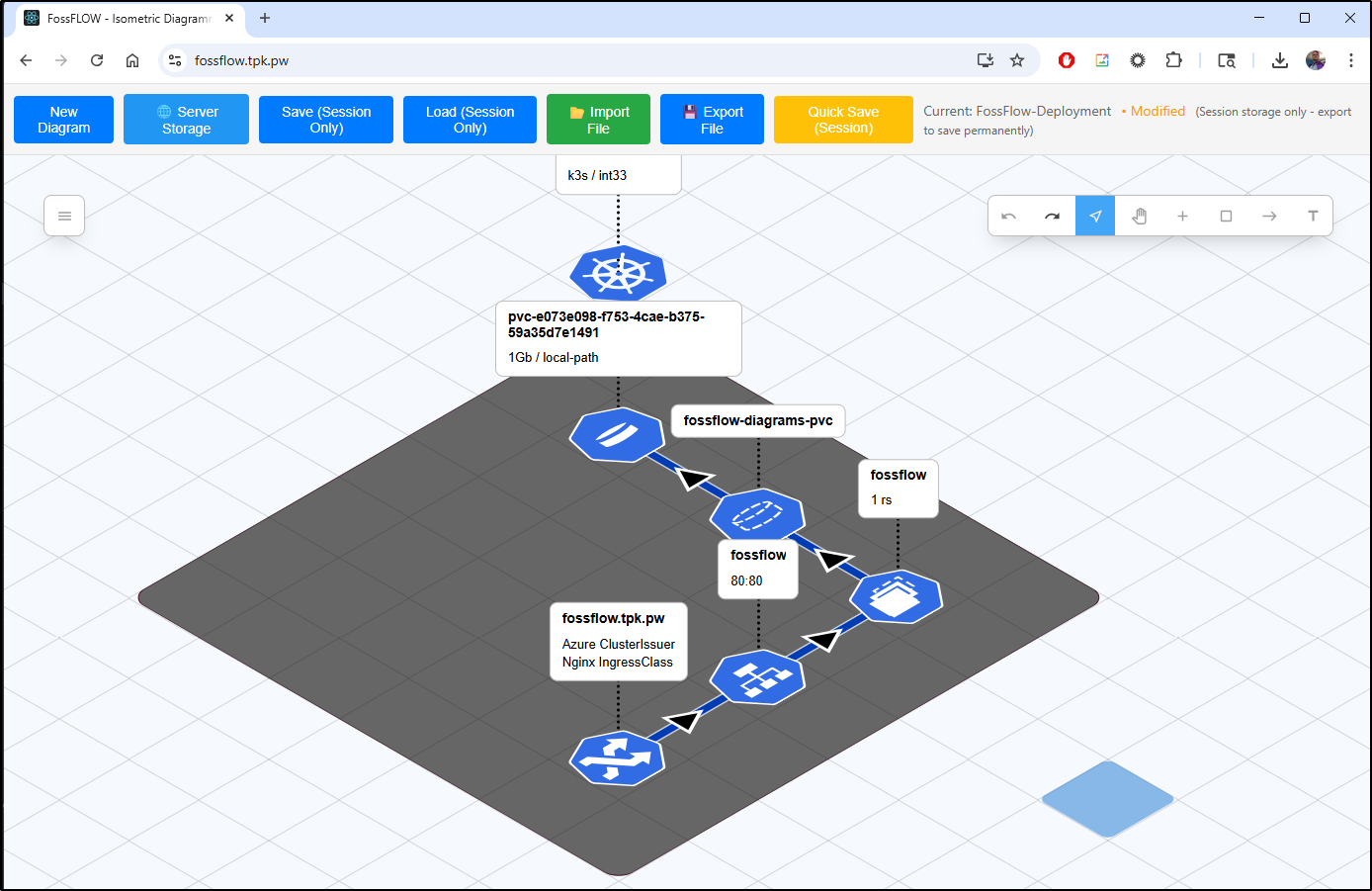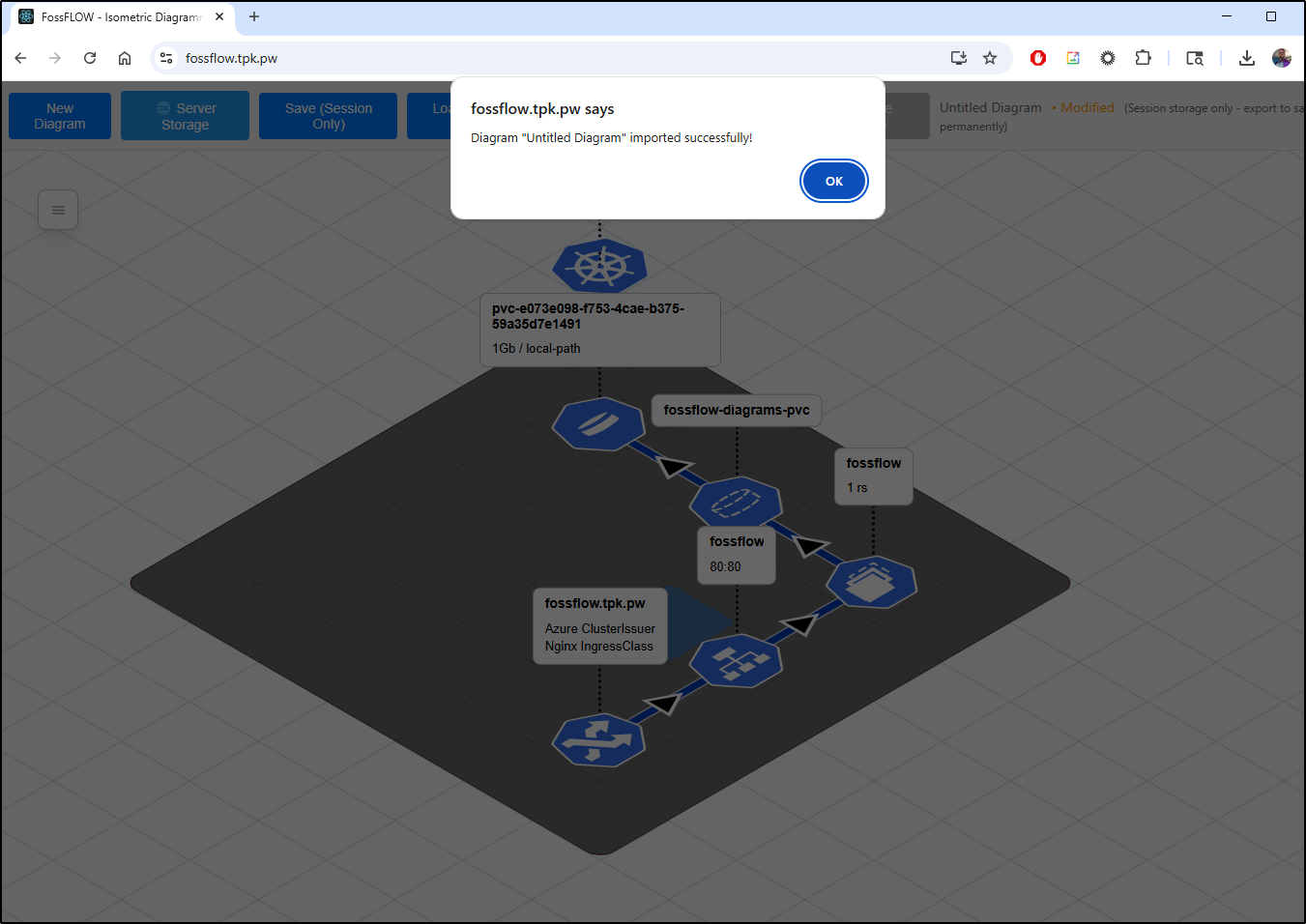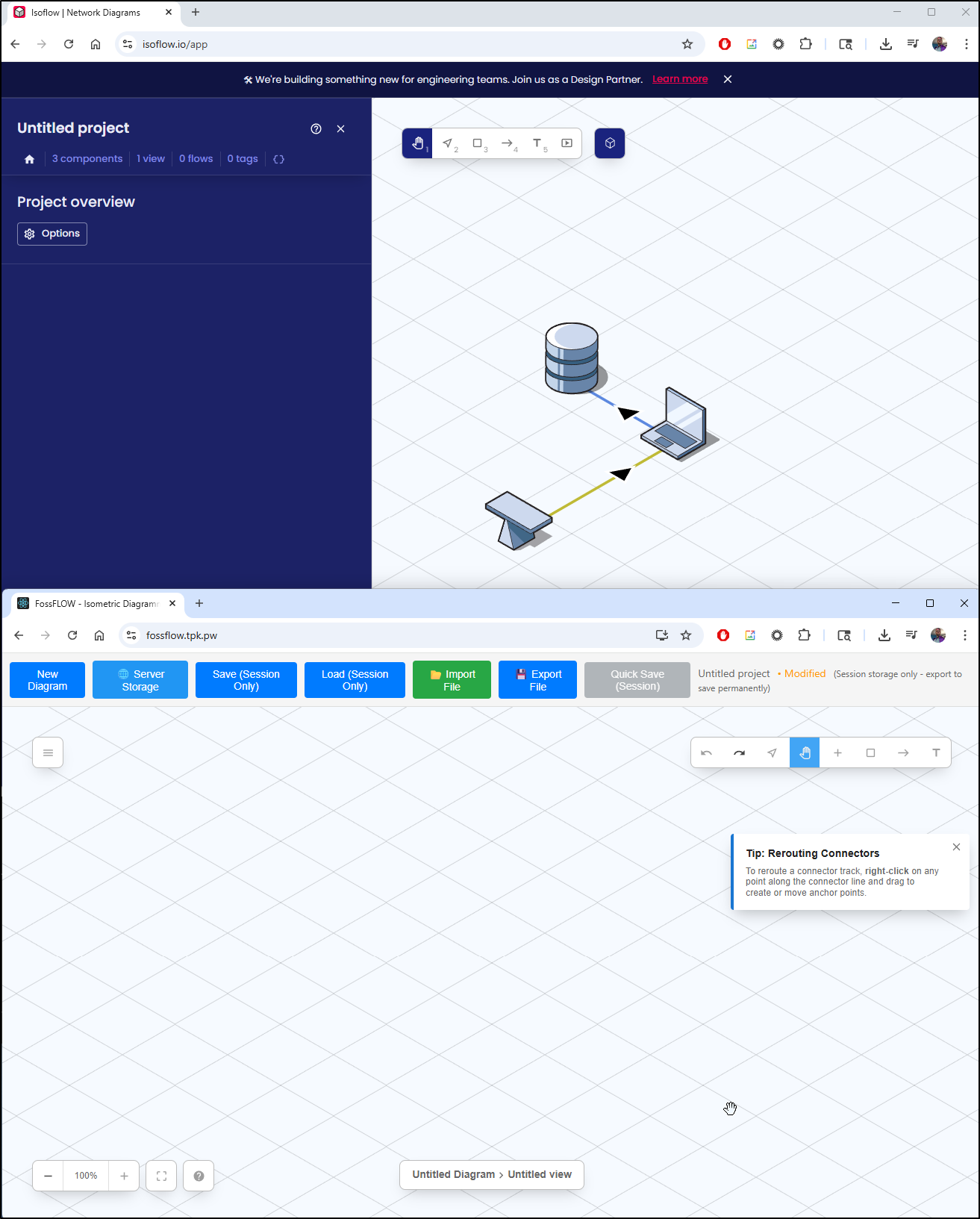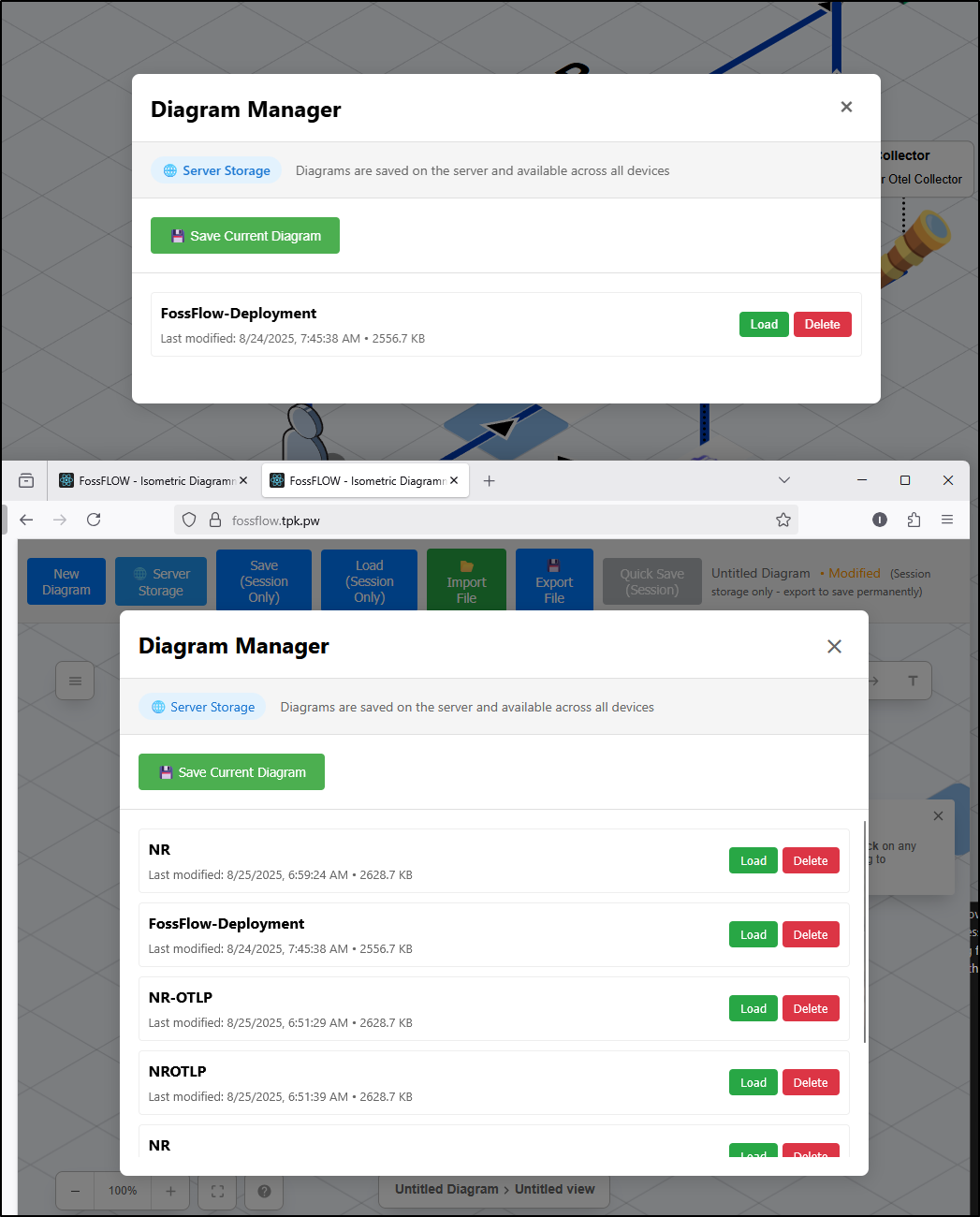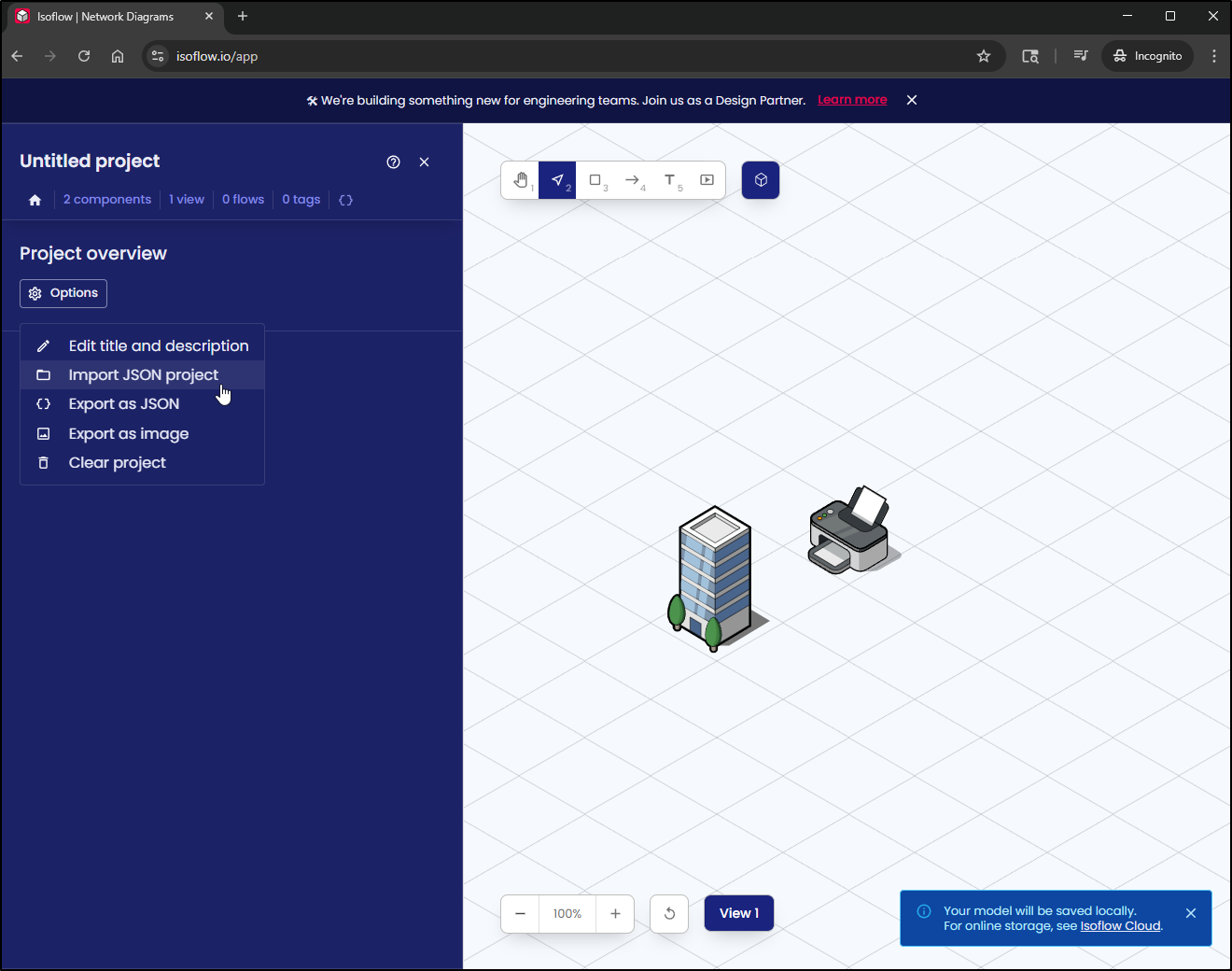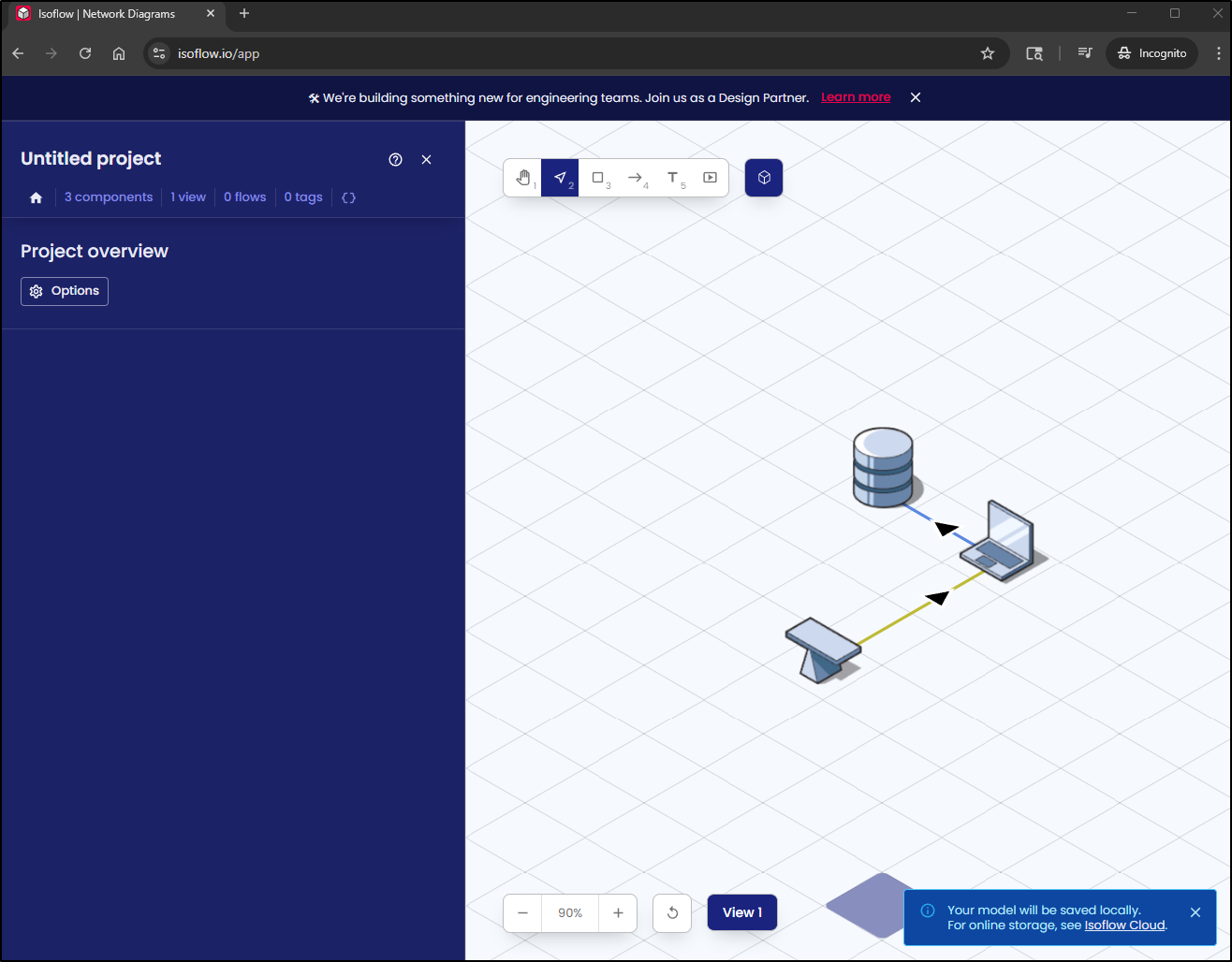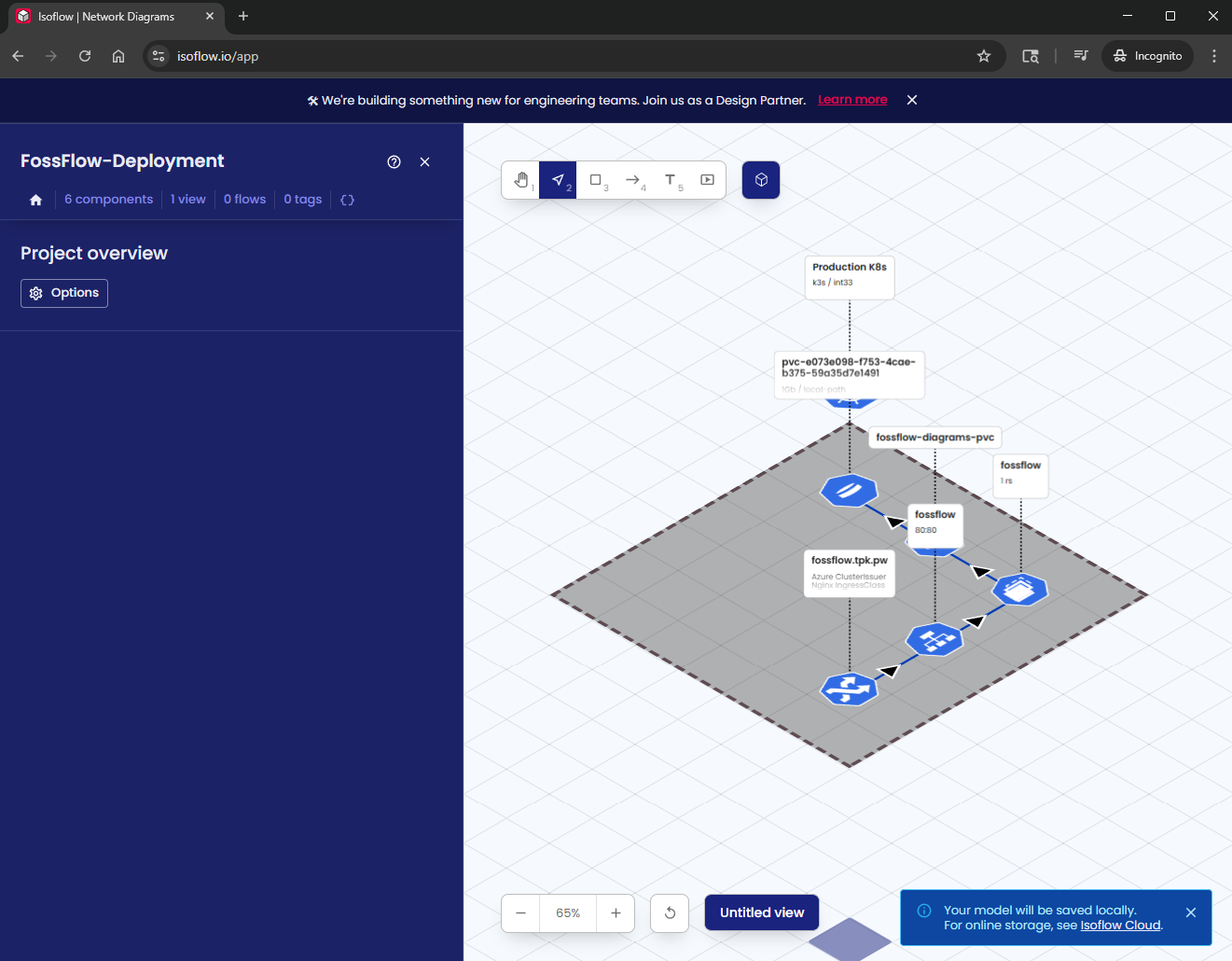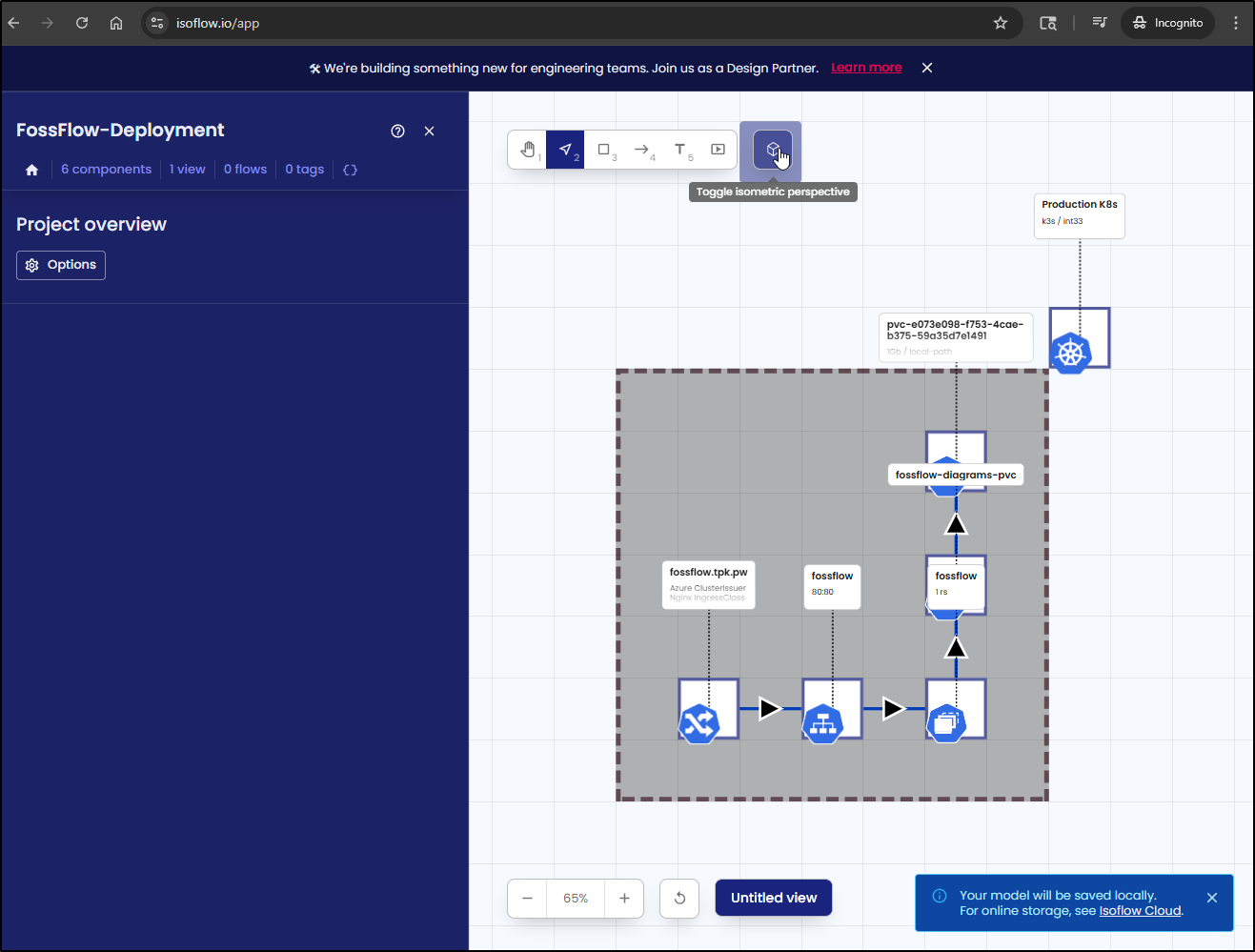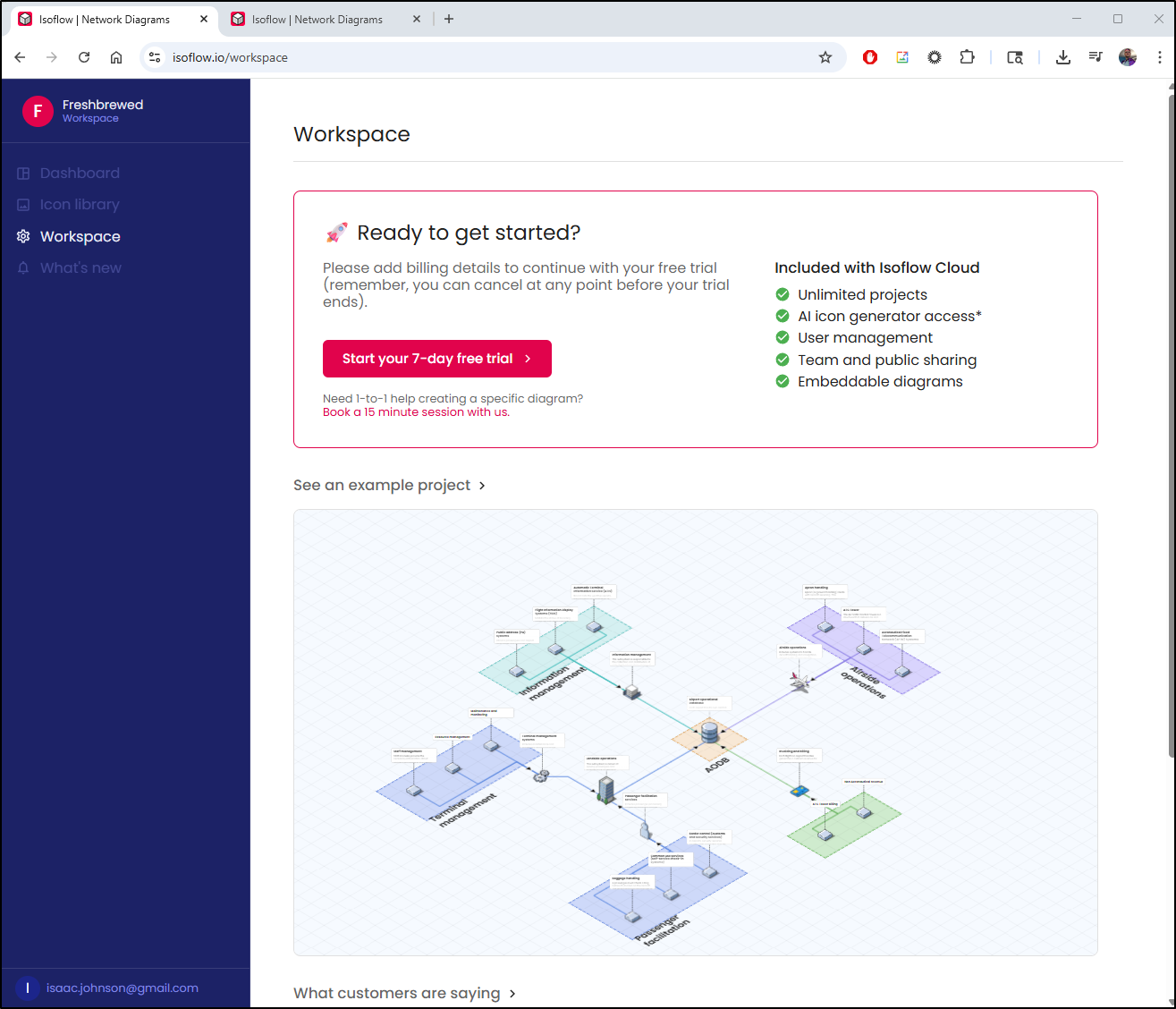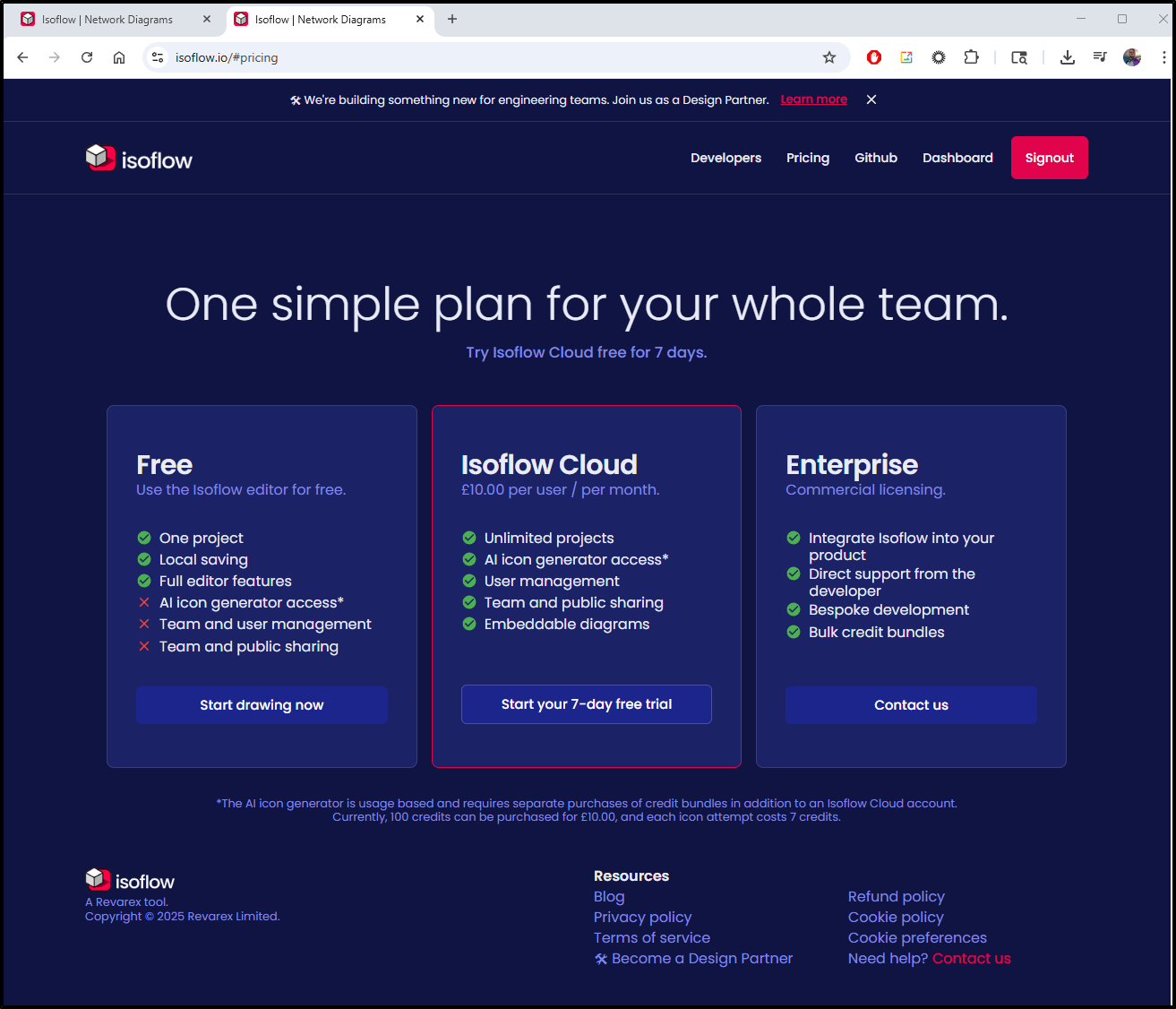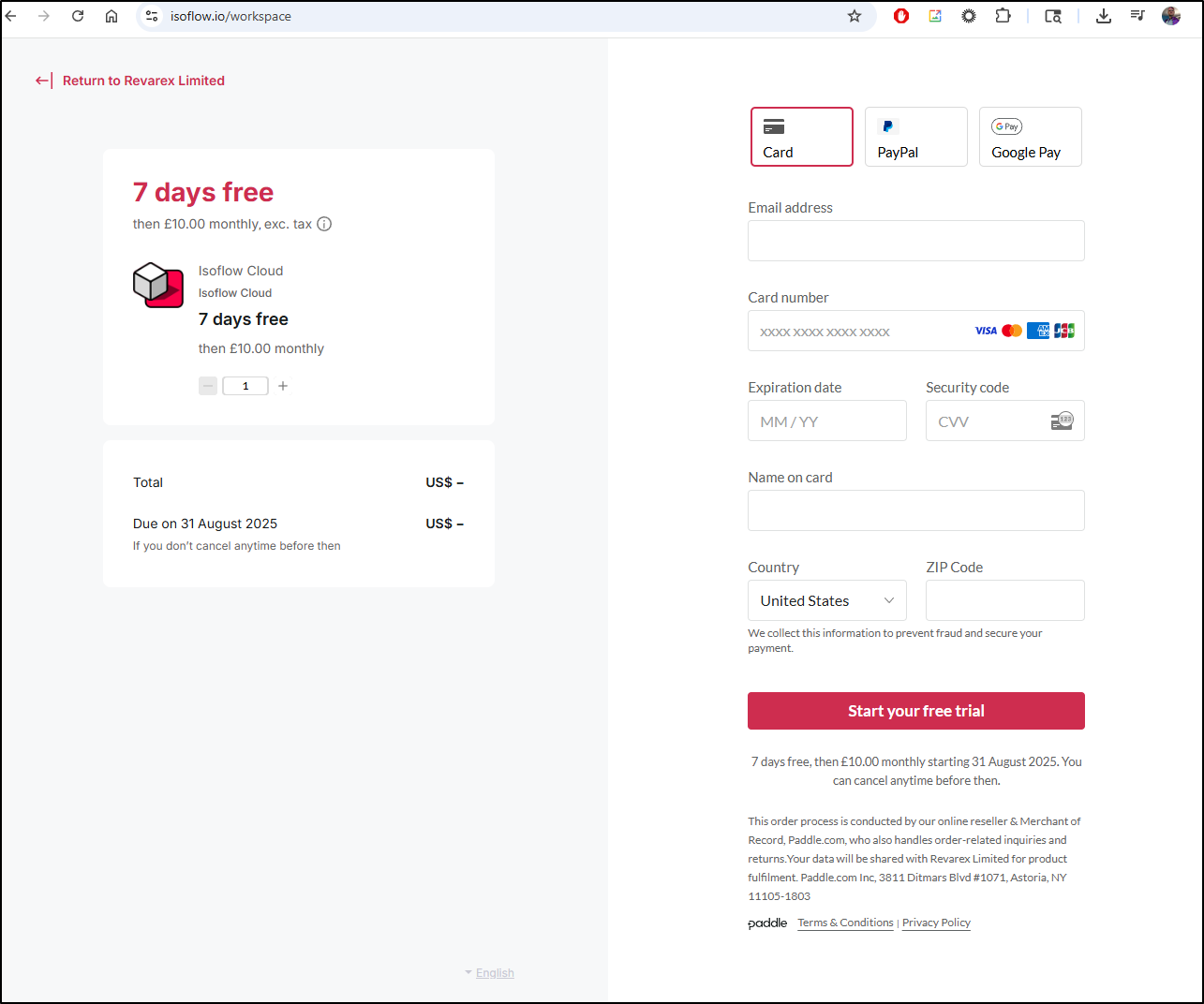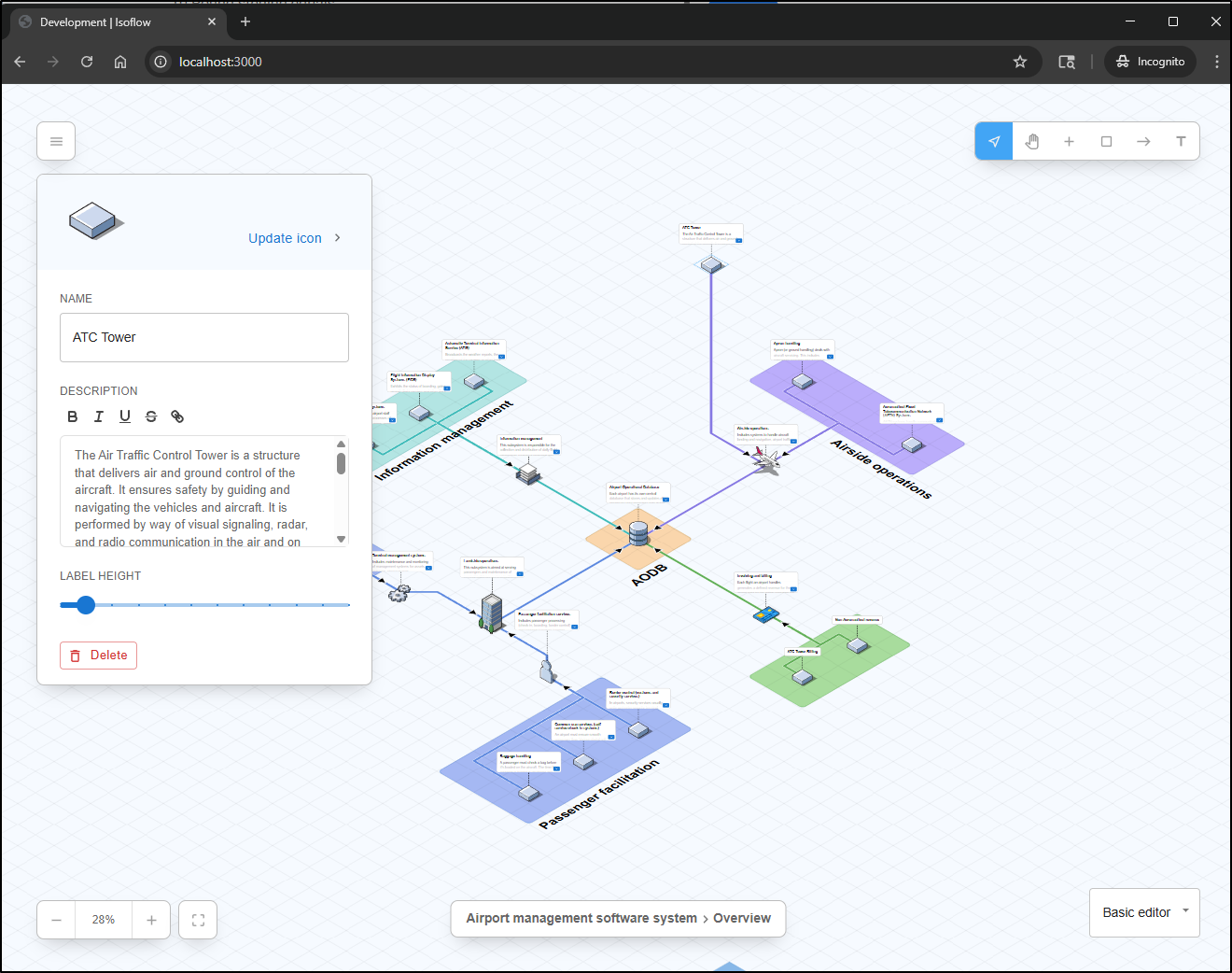Published: Aug 26, 2025 by Isaac Johnson
Today we’ll look at Kaneo, a pretty nice open-source PjM tool in docker and SaaS then look to host it externally.
We’ll also look at FossFlow which is a really slick Open-source Isometric diagram tool. Like before, we look at Docker and Kubernetes and hosting externally as well as some usage details.
Lastly, I’ll touch on a commercial product (but with a free guest instance) called IsoFlow which was the base from which FossFlow forked. We’ll look at the SaaS and the Community Edition running locally.
Kaneo
I’ve used Vikunja now for months, but had a note to take a look at another good Open-source PjM suite, Kaneo.
I saw it first mentioned back in April in this Marius post.
I’m going to start with the docker-compose locally
$ cat docker-compose.yml
services:
postgres:
image: postgres:16-alpine
environment:
POSTGRES_DB: kaneo
POSTGRES_USER: mykaneouser
POSTGRES_PASSWORD: mykaneopass123
volumes:
- postgres_data:/var/lib/postgresql/data
restart: unless-stopped
backend:
image: ghcr.io/usekaneo/api:latest
environment:
JWT_ACCESS: "your-secret-key-here"
DATABASE_URL: "postgresql://mykaneouser:mykaneopass123@postgres:5432/kaneo"
ports:
- 1337:1337
depends_on:
- postgres
restart: unless-stopped
frontend:
image: ghcr.io/usekaneo/web:latest
environment:
KANEO_API_URL: "http://localhost:1337"
ports:
- 5173:5173
depends_on:
- backend
restart: unless-stopped
volumes:
postgres_data:
I’ll fire it up interactively to start
builder@DESKTOP-QADGF36:~/Workspaces/kaneo$ docker compose up
[+] Running 27/27
✔ backend Pulled 18.6s
✔ 3bce96456554 Pull complete 6.5s
✔ 2bde47b9f7c3 Pull complete 6.6s
✔ db3e2f2b6054 Pull complete 6.7s
✔ f654cfc9cb19 Pull complete 6.7s
✔ 4f4fb700ef54 Pull complete 6.7s
✔ ceb3a1c625c0 Pull complete 6.8s
✔ 863993be634a Pull complete 6.8s
✔ 90b66fb610c9 Pull complete 6.8s
✔ a70b1328ca1e Pull complete 6.8s
✔ 178e58b90e0a Pull complete 16.8s
✔ c3e3b567e60b Pull complete 16.9s
✔ 765b33a5772f Pull complete 16.9s
✔ frontend Pulled 4.7s
✔ 4abcf2066143 Pull complete 0.9s
✔ fc21a1d387f5 Pull complete 1.8s
✔ e6ef242c1570 Pull complete 1.8s
✔ 13fcfbc94648 Pull complete 1.8s
✔ d4bca490e609 Pull complete 1.8s
✔ 5406ed7b06d9 Pull complete 1.9s
✔ 8a3742a9529d Pull complete 1.9s
✔ 0d0c16747d2c Pull complete 2.8s
✔ a35acf90e25d Pull complete 2.8s
✔ 567123fc343b Pull complete 2.9s
✔ f3721f3008a0 Pull complete 2.9s
✔ 608cacd076c7 Pull complete 3.0s
✔ 9fc72ec3b0bc Pull complete 3.0s
[+] Running 5/5
✔ Network kaneo_default Created 0.1s
✔ Volume "kaneo_postgres_data" Created 0.0s
✔ Container kaneo-postgres-1 Created 0.4s
✔ Container kaneo-backend-1 Created 0.1s
✔ Container kaneo-frontend-1 Created 0.1s
Attaching to backend-1, frontend-1, postgres-1
postgres-1 | The files belonging to this database system will be owned by user "postgres".
postgres-1 | This user must also own the server process.
postgres-1 |
postgres-1 | The database cluster will be initialized with locale "en_US.utf8".
postgres-1 | The default database encoding has accordingly been set to "UTF8".
postgres-1 | The default text search configuration will be set to "english".
postgres-1 |
postgres-1 | Data page checksums are disabled.
postgres-1 |
postgres-1 | fixing permissions on existing directory /var/lib/postgresql/data ... ok
postgres-1 | creating subdirectories ... ok
postgres-1 | selecting dynamic shared memory implementation ... posix
postgres-1 | selecting default max_connections ... 100
postgres-1 | selecting default shared_buffers ... 128MB
postgres-1 | selecting default time zone ... UTC
postgres-1 | creating configuration files ... ok
postgres-1 | running bootstrap script ... ok
postgres-1 | sh: locale: not found
postgres-1 | 2025-08-22 13:36:09.986 UTC [35] WARNING: no usable system locales were found
backend-1 | [dotenv@17.2.1] injecting env (0) from .env -- tip: 🔐 prevent building .env in docker: https://dotenvx.com/prebuild
frontend-1 | /docker-entrypoint.sh: /docker-entrypoint.d/ is not empty, will attempt to perform configuration
frontend-1 | /docker-entrypoint.sh: Looking for shell scripts in /docker-entrypoint.d/
frontend-1 | /docker-entrypoint.sh: Launching /docker-entrypoint.d/10-listen-on-ipv6-by-default.sh
frontend-1 | 10-listen-on-ipv6-by-default.sh: info: Getting the checksum of /etc/nginx/conf.d/default.conf
backend-1 | [dotenv@17.2.1] injecting env (0) from .env -- tip: 🔐 prevent building .env in docker: https://dotenvx.com/prebuild
backend-1 | [dotenv@17.2.1] injecting env (0) from .env -- tip: 🛠️ run anywhere with `dotenvx run -- yourcommand`
backend-1 | Migrating database...
frontend-1 | 10-listen-on-ipv6-by-default.sh: info: /etc/nginx/conf.d/default.conf differs from the packaged version
frontend-1 | /docker-entrypoint.sh: Sourcing /docker-entrypoint.d/15-local-resolvers.envsh
frontend-1 | /docker-entrypoint.sh: Launching /docker-entrypoint.d/20-envsubst-on-templates.sh
frontend-1 | /docker-entrypoint.sh: Launching /docker-entrypoint.d/30-tune-worker-processes.sh
frontend-1 | /docker-entrypoint.sh: Launching /docker-entrypoint.d/env.sh
frontend-1 | Starting environment variable replacement...
frontend-1 | Found KANEO_API_URL: http://localhost:1337
backend-1 | 🏃 Hono API is running at http://localhost:1337
backend-1 | /app/node_modules/.pnpm/drizzle-orm@0.44.4_@types+better-sqlite3@7.6.13_@types+pg@8.15.5_better-sqlite3@11.10.0_bun-types@1.2.8_pg@8.16.3/node_modules/src/pg-core/session.ts:73
backend-1 | throw new DrizzleQueryError(queryString, params, e as Error);
backend-1 | ^
backend-1 |
backend-1 |
backend-1 | DrizzleQueryError: Failed query: CREATE SCHEMA IF NOT EXISTS "drizzle"
backend-1 | params:
backend-1 | at NodePgPreparedQuery.queryWithCache (/app/node_modules/.pnpm/drizzle-orm@0.44.4_@types+better-sqlite3@7.6.13_@types+pg@8.15.5_better-sqlite3@11.10.0_bun-types@1.2.8_pg@8.16.3/node_modules/src/pg-core/session.ts:73:11)
backend-1 | at process.processTicksAndRejections (node:internal/process/task_queues:95:5)
backend-1 | at PgDialect.migrate (/app/node_modules/.pnpm/drizzle-orm@0.44.4_@types+better-sqlite3@7.6.13_@types+pg@8.15.5_better-sqlite3@11.10.0_bun-types@1.2.8_pg@8.16.3/node_modules/src/pg-core/dialect.ts:85:3)
backend-1 | at migrate (/app/node_modules/.pnpm/drizzle-orm@0.44.4_@types+better-sqlite3@7.6.13_@types+pg@8.15.5_better-sqlite3@11.10.0_bun-types@1.2.8_pg@8.16.3/node_modules/src/postgres-js/migrator.ts:10:2) {
backend-1 | query: 'CREATE SCHEMA IF NOT EXISTS "drizzle"',
backend-1 | params: [],
backend-1 | cause: Error: connect ECONNREFUSED 172.25.0.2:5432
backend-1 | at /app/node_modules/.pnpm/pg-pool@3.10.1_pg@8.16.3/node_modules/pg-pool/index.js:45:11
backend-1 | at process.processTicksAndRejections (node:internal/process/task_queues:95:5)
backend-1 | at <anonymous> (/app/node_modules/.pnpm/drizzle-orm@0.44.4_@types+better-sqlite3@7.6.13_@types+pg@8.15.5_better-sqlite3@11.10.0_bun-types@1.2.8_pg@8.16.3/node_modules/src/node-postgres/session.ts:149:14)
backend-1 | at NodePgPreparedQuery.queryWithCache (/app/node_modules/.pnpm/drizzle-orm@0.44.4_@types+better-sqlite3@7.6.13_@types+pg@8.15.5_better-sqlite3@11.10.0_bun-types@1.2.8_pg@8.16.3/node_modules/src/pg-core/session.ts:71:12)
backend-1 | at PgDialect.migrate (/app/node_modules/.pnpm/drizzle-orm@0.44.4_@types+better-sqlite3@7.6.13_@types+pg@8.15.5_better-sqlite3@11.10.0_bun-types@1.2.8_pg@8.16.3/node_modules/src/pg-core/dialect.ts:85:3)
backend-1 | at migrate (/app/node_modules/.pnpm/drizzle-orm@0.44.4_@types+better-sqlite3@7.6.13_@types+pg@8.15.5_better-sqlite3@11.10.0_bun-types@1.2.8_pg@8.16.3/node_modules/src/postgres-js/migrator.ts:10:2) {
backend-1 | errno: -111,
backend-1 | code: 'ECONNREFUSED',
backend-1 | syscall: 'connect',
backend-1 | address: '172.25.0.2',
backend-1 | port: 5432
backend-1 | }
backend-1 | }
backend-1 |
backend-1 | Node.js v20.12.2
frontend-1 | Replaced KANEO_API_URL with http://localhost:1337
frontend-1 | Environment variable replacement complete
frontend-1 | /docker-entrypoint.sh: Configuration complete; ready for start up
frontend-1 | 2025/08/22 13:36:10 [notice] 1#1: using the "epoll" event method
frontend-1 | 2025/08/22 13:36:10 [notice] 1#1: nginx/1.25.5
frontend-1 | 2025/08/22 13:36:10 [notice] 1#1: built by gcc 13.2.1 20231014 (Alpine 13.2.1_git20231014)
frontend-1 | 2025/08/22 13:36:10 [notice] 1#1: OS: Linux 6.6.87.2-microsoft-standard-WSL2
frontend-1 | 2025/08/22 13:36:10 [notice] 1#1: getrlimit(RLIMIT_NOFILE): 1048576:1048576
frontend-1 | 2025/08/22 13:36:10 [notice] 1#1: start worker processes
frontend-1 | 2025/08/22 13:36:10 [notice] 1#1: start worker process 41
frontend-1 | 2025/08/22 13:36:10 [notice] 1#1: start worker process 42
frontend-1 | 2025/08/22 13:36:10 [notice] 1#1: start worker process 43
frontend-1 | 2025/08/22 13:36:10 [notice] 1#1: start worker process 44
frontend-1 | 2025/08/22 13:36:10 [notice] 1#1: start worker process 45
frontend-1 | 2025/08/22 13:36:10 [notice] 1#1: start worker process 46
frontend-1 | 2025/08/22 13:36:10 [notice] 1#1: start worker process 47
frontend-1 | 2025/08/22 13:36:10 [notice] 1#1: start worker process 48
frontend-1 | 2025/08/22 13:36:10 [notice] 1#1: start worker process 49
frontend-1 | 2025/08/22 13:36:10 [notice] 1#1: start worker process 50
frontend-1 | 2025/08/22 13:36:10 [notice] 1#1: start worker process 51
frontend-1 | 2025/08/22 13:36:10 [notice] 1#1: start worker process 52
frontend-1 | 2025/08/22 13:36:10 [notice] 1#1: start worker process 53
frontend-1 | 2025/08/22 13:36:10 [notice] 1#1: start worker process 54
frontend-1 | 2025/08/22 13:36:10 [notice] 1#1: start worker process 55
frontend-1 | 2025/08/22 13:36:10 [notice] 1#1: start worker process 56
postgres-1 | performing post-bootstrap initialization ... ok
postgres-1 | initdb: warning: enabling "trust" authentication for local connections
postgres-1 | initdb: hint: You can change this by editing pg_hba.conf or using the option -A, or --auth-local and --auth-host, the next time you run initdb.
postgres-1 | syncing data to disk ... ok
postgres-1 |
postgres-1 |
postgres-1 | Success. You can now start the database server using:
postgres-1 |
postgres-1 | pg_ctl -D /var/lib/postgresql/data -l logfile start
postgres-1 |
postgres-1 | waiting for server to start....2025-08-22 13:36:11.095 UTC [41] LOG: starting PostgreSQL 16.8 on x86_64-pc-linux-musl, compiled by gcc (Alpine 14.2.0) 14.2.0, 64-bit
postgres-1 | 2025-08-22 13:36:11.097 UTC [41] LOG: listening on Unix socket "/var/run/postgresql/.s.PGSQL.5432"
postgres-1 | 2025-08-22 13:36:11.104 UTC [44] LOG: database system was shut down at 2025-08-22 13:36:10 UTC
postgres-1 | 2025-08-22 13:36:11.112 UTC [41] LOG: database system is ready to accept connections
postgres-1 | done
postgres-1 | server started
postgres-1 | CREATE DATABASE
postgres-1 |
postgres-1 |
postgres-1 | /usr/local/bin/docker-entrypoint.sh: ignoring /docker-entrypoint-initdb.d/*
postgres-1 |
postgres-1 | waiting for server to shut down...2025-08-22 13:36:11.297 UTC [41] LOG: received fast shutdown request
postgres-1 | .2025-08-22 13:36:11.300 UTC [41] LOG: aborting any active transactions
postgres-1 | 2025-08-22 13:36:11.304 UTC [41] LOG: background worker "logical replication launcher" (PID 47) exited with exit code 1
postgres-1 | 2025-08-22 13:36:11.304 UTC [42] LOG: shutting down
postgres-1 | 2025-08-22 13:36:11.306 UTC [42] LOG: checkpoint starting: shutdown immediate
backend-1 exited with code 0
postgres-1 | 2025-08-22 13:36:11.437 UTC [42] LOG: checkpoint complete: wrote 924 buffers (5.6%); 0 WAL file(s) added, 0 removed, 0 recycled; write=0.040 s, sync=0.085 s, total=0.133 s; sync files=301, longest=0.003 s, average=0.001 s; distance=4267 kB, estimate=4267 kB; lsn=0/191AB60, redo lsn=0/191AB60
postgres-1 | 2025-08-22 13:36:11.456 UTC [41] LOG: database system is shut down
postgres-1 | done
postgres-1 | server stopped
postgres-1 |
postgres-1 | PostgreSQL init process complete; ready for start up.
postgres-1 |
postgres-1 | 2025-08-22 13:36:11.530 UTC [1] LOG: starting PostgreSQL 16.8 on x86_64-pc-linux-musl, compiled by gcc (Alpine 14.2.0) 14.2.0, 64-bit
postgres-1 | 2025-08-22 13:36:11.530 UTC [1] LOG: listening on IPv4 address "0.0.0.0", port 5432
postgres-1 | 2025-08-22 13:36:11.530 UTC [1] LOG: listening on IPv6 address "::", port 5432
postgres-1 | 2025-08-22 13:36:11.534 UTC [1] LOG: listening on Unix socket "/var/run/postgresql/.s.PGSQL.5432"
postgres-1 | 2025-08-22 13:36:11.542 UTC [57] LOG: database system was shut down at 2025-08-22 13:36:11 UTC
postgres-1 | 2025-08-22 13:36:11.549 UTC [1] LOG: database system is ready to accept connections
backend-1 | [dotenv@17.2.1] injecting env (0) from .env -- tip: 🔐 encrypt with Dotenvx: https://dotenvx.com
backend-1 | [dotenv@17.2.1] injecting env (0) from .env -- tip: ⚙️ enable debug logging with { debug: true }
backend-1 | [dotenv@17.2.1] injecting env (0) from .env -- tip: 🔐 encrypt with Dotenvx: https://dotenvx.com
backend-1 | Migrating database...
backend-1 | 🏃 Hono API is running at http://localhost:1337
I can see the API backend is up
I can access the Web interface at port 5173
I’ll create an account
Then create a workspace
Now that I’m in my new workspace, I can create a project
It will suggest a key for tickets as we create the new project
I’m now dropped into a nice Kanban board with To Do, In Progress, In Review and Done.
Though, it’s easy enough to convert that to a list
I’ll flip to light mode and compact interface, then create a new ticket
It does let me add arbitrary tags and set assignees, but at least in this create interface, doesn’t take in markdown
The created ticket does have some nice features like Time Tracking, but I’m not as big a fan of WYSIWYG editors
Actually, i tweaked it and it does look like it took the markdown (just needed a space after pound sign)
as we can see above, it seems to support some markdown but not all. I actually really use tables so that would stink to have no table support.
I was curious if Vikunja does tables as I shouldn’t judge so quick
as you can see with the actual Vikunja ticket for this post, I can add tables with the WYSIWYG editor, but not markdown.
Let’s test some time tracking
I’m going back and forth in my head if I like this - one one hand I like that the start/stop is independent. And in moving to done, whatever was logged thus far is captured. and it lets me add time if I, say, missed an item and want to capture time
However, I do like systems that just capture this for me so I can track. If I was billing clients, however, having a very manual start/pause/stop is better as I tend to multi-task (ie. having an active work item but not actioning it at this moment).
Another confusing thing to me is that I have logged time now, but the Time Tracking and Analytics sections are still grayed out
Setting up prod
Since I want to experiment with the API, I will set this up in the production cluster
I’ll want to sort out an A Record first
$ az account set --subscription "Pay-As-You-Go" && az network dns record-set a add-record -g idjdnsrg -z tpk.pw -a 75.73.224.240 -n kaneo
{
"ARecords": [
{
"ipv4Address": "75.73.224.240"
}
],
"TTL": 3600,
"etag": "03c992bd-4665-4e5f-a5f6-af846c084466",
"fqdn": "kaneo.tpk.pw.",
"id": "/subscriptions/d955c0ba-13dc-44cf-a29a-8fed74cbb22d/resourceGroups/idjdnsrg/providers/Microsoft.Network/dnszones/tpk.pw/A/kaneo",
"name": "kaneo",
"provisioningState": "Succeeded",
"resourceGroup": "idjdnsrg",
"targetResource": {},
"trafficManagementProfile": {},
"type": "Microsoft.Network/dnszones/A"
}
I’ll want to use the chart, but it’s in the GIT repo (not in a helm repo)
builder@LuiGi:~/Workspaces$ git clone https://github.com/usekaneo/kaneo.git
Cloning into 'kaneo'...
remote: Enumerating objects: 8181, done.
remote: Counting objects: 100% (216/216), done.
remote: Compressing objects: 100% (144/144), done.
remote: Total 8181 (delta 112), reused 105 (delta 68), pack-reused 7965 (from 2)
Receiving objects: 100% (8181/8181), 7.56 MiB | 6.64 MiB/s, done.
Resolving deltas: 100% (4399/4399), done.
builder@LuiGi:~/Workspaces$ cd kaneo/
builder@LuiGi:~/Workspaces/kaneo$
I’ll make a values file with my DNS name and cluster issuer
$ cat myvalues.yaml
# PostgreSQL configuration
postgresql:
auth:
password: "your-secure-db-password"
persistence:
enabled: true
size: 20Gi
storageClass: "local-path"
resources:
limits:
cpu: 500m
memory: 512Mi
requests:
cpu: 100m
memory: 128Mi
# API configuration
api:
env:
jwtAccess: "your-secure-jwt-token"
persistence:
enabled: true
size: 5Gi
storageClass: "local-path"
# For production, consider setting resource limits
resources:
limits:
cpu: 500m
memory: 512Mi
requests:
cpu: 100m
memory: 256Mi
# Web configuration
web:
env:
apiUrl: "https://kaneo.tpk.pw"
resources:
limits:
cpu: 300m
memory: 256Mi
requests:
cpu: 100m
memory: 128Mi
ingress:
enabled: true
className: "nginx"
annotations:
cert-manager.io/cluster-issuer: azuredns-tpkpw
nginx.ingress.kubernetes.io/ssl-redirect: "true"
nginx.ingress.kubernetes.io/rewrite-target: /$1
hosts:
- host: kaneo.tpk.pw
paths:
- path: /?(.*)
pathType: Prefix
service: web
port: 80
- path: /api/?(.*)
pathType: Prefix
service: api
port: 1337
tls:
- secretName: kaneo-tls
hosts:
- kaneo.tpk.pw
Then install
$ helm install -f ./myvalues.yaml kaneo ./charts/kaneo --namespace kaneo --create-namespace
NAME: kaneo
LAST DEPLOYED: Sat Aug 23 16:52:42 2025
NAMESPACE: kaneo
STATUS: deployed
REVISION: 1
TEST SUITE: None
NOTES:
Thank you for installing kaneo.
Your release is named kaneo.
To learn more about the release, try:
$ helm status kaneo
$ helm get all kaneo
You can access the application using these URLs:
https://kaneo.tpk.pw
Note: This chart uses path patterns with regex capture groups for nginx:
- /?(.*) -> for web frontend
- /api/?(.*) -> for API requests
Make sure your ingress controller supports the configured annotations:
nginx.ingress.kubernetes.io/rewrite-target: /$1
NOTES:
1. Kaneo is configured with SQLite database for persistence.
A PersistentVolumeClaim is used to store the SQLite database file.
2. Important environment variables:
- API:
- JWT_ACCESS: Secret key for generating JWT tokens (currently set to: your-secure-jwt-token)
- DB_PATH: Path to the SQLite database file (set to: "/")
- Web:
- KANEO_API_URL: URL of the API service (set to: "https://kaneo.tpk.pw/api")
You can customize these values in your values.yaml file.
3. IMPORTANT: This chart uses a combined pod approach where both the API and Web containers
run in the same pod. This allows the web frontend to connect directly to the API via
localhost, simplifying the deployment and eliminating cross-origin issues.
When I see the cert satisfied
builder@LuiGi:~/Workspaces/kaneo$ kubectl get cert -n kaneo
NAME READY SECRET AGE
kaneo-tls False kaneo-tls 70s
builder@LuiGi:~/Workspaces/kaneo$ kubectl get cert -n kaneo
NAME READY SECRET AGE
kaneo-tls True kaneo-tls 107s
But I don’t see the app
The pods are up
$ kubectl get po -n kaneo -l app.kubernetes.io/instance=kaneo,app.kubernetes.io/name=kaneo
NAME READY STATUS RESTARTS AGE
kaneo-64bc789697-8kgz9 2/2 Running 2 (3m55s ago) 4m15s
kaneo-postgresql-767c55694f-6jccs 1/1 Running 0 4m15s
However nothing seems to work.. the pod crashes on DB migrations now
$ kubectl get po -n kaneo -l app.kubernetes.io/instance=kaneo,app.kubernetes.io/name=kan
eo,app.kubernetes.io/component=web
NAME READY STATUS RESTARTS AGE
kaneo-fd546974-zkrvw 1/2 Running 2 (12m ago) 12m
I can see the DB is up
$ kubectl get po -n kaneo
NAME READY STATUS RESTARTS AGE
kaneo-fd546974-zkrvw 1/2 Running 2 (13m ago) 13m
kaneo-postgresql-767c55694f-lvtfv 1/1 Running 0 13m
yet the failures point to migrations
$ kubectl logs -n kaneo --previous kaneo-fd546974-zkrvw
Defaulted container "api" out of: api, web
[dotenv@17.2.1] injecting env (0) from .env -- tip: ⚙️ load multiple .env files with { path: ['.env.local', '.env'] }
[dotenv@17.2.1] injecting env (0) from .env -- tip: ⚙️ load multiple .env files with { path: ['.env.local', '.env'] }
[dotenv@17.2.1] injecting env (0) from .env -- tip: ⚙️ suppress all logs with { quiet: true }
Migrating database...
🏃 Hono API is running at http://localhost:1337
/app/node_modules/.pnpm/drizzle-orm@0.44.4_@types+better-sqlite3@7.6.13_@types+pg@8.15.5_better-sqlite3@11.10.0_bun-types@1.2.8_pg@8.16.3/node_modules/src/pg-core/session.ts:73
throw new DrizzleQueryError(queryString, params, e as Error);
^
DrizzleQueryError: Failed query: CREATE SCHEMA IF NOT EXISTS "drizzle"
params:
at NodePgPreparedQuery.queryWithCache (/app/node_modules/.pnpm/drizzle-orm@0.44.4_@types+better-sqlite3@7.6.13_@types+pg@8.15.5_better-sqlite3@11.10.0_bun-types@1.2.8_pg@8.16.3/node_modules/src/pg-core/session.ts:73:11)
at process.processTicksAndRejections (node:internal/process/task_queues:95:5)
at PgDialect.migrate (/app/node_modules/.pnpm/drizzle-orm@0.44.4_@types+better-sqlite3@7.6.13_@types+pg@8.15.5_better-sqlite3@11.10.0_bun-types@1.2.8_pg@8.16.3/node_modules/src/pg-core/dialect.ts:85:3)
at migrate (/app/node_modules/.pnpm/drizzle-orm@0.44.4_@types+better-sqlite3@7.6.13_@types+pg@8.15.5_better-sqlite3@11.10.0_bun-types@1.2.8_pg@8.16.3/node_modules/src/postgres-js/migrator.ts:10:2) {
query: 'CREATE SCHEMA IF NOT EXISTS "drizzle"',
params: [],
cause: Error: connect ECONNREFUSED 10.43.32.114:5432
at /app/node_modules/.pnpm/pg-pool@3.10.1_pg@8.16.3/node_modules/pg-pool/index.js:45:11
at process.processTicksAndRejections (node:internal/process/task_queues:95:5)
at <anonymous> (/app/node_modules/.pnpm/drizzle-orm@0.44.4_@types+better-sqlite3@7.6.13_@types+pg@8.15.5_better-sqlite3@11.10.0_bun-types@1.2.8_pg@8.16.3/node_modules/src/node-postgres/session.ts:149:14)
at NodePgPreparedQuery.queryWithCache (/app/node_modules/.pnpm/drizzle-orm@0.44.4_@types+better-sqlite3@7.6.13_@types+pg@8.15.5_better-sqlite3@11.10.0_bun-types@1.2.8_pg@8.16.3/node_modules/src/pg-core/session.ts:71:12)
at PgDialect.migrate (/app/node_modules/.pnpm/drizzle-orm@0.44.4_@types+better-sqlite3@7.6.13_@types+pg@8.15.5_better-sqlite3@11.10.0_bun-types@1.2.8_pg@8.16.3/node_modules/src/pg-core/dialect.ts:85:3)
at migrate (/app/node_modules/.pnpm/drizzle-orm@0.44.4_@types+better-sqlite3@7.6.13_@types+pg@8.15.5_better-sqlite3@11.10.0_bun-types@1.2.8_pg@8.16.3/node_modules/src/postgres-js/migrator.ts:10:2) {
errno: -111,
code: 'ECONNREFUSED',
syscall: 'connect',
address: '10.43.32.114',
port: 5432
}
}
Node.js v20.12.2
Let’s try another way.
I’ll fire this up on my dockerhost
builder@builder-T100:~/kaneo$ docker compose up -d
[+] Running 39/39
✔ postgres 11 layers [⣿⣿⣿⣿⣿⣿⣿⣿⣿⣿⣿] 0B/0B Pulled 9.7s
✔ 9824c27679d3 Pull complete 3.9s
✔ 01ef787617d5 Pull complete 3.9s
✔ d444581c5dc1 Pull complete 4.1s
✔ 127625cab66d Pull complete 4.1s
✔ 7f8bf47818a2 Pull complete 4.3s
✔ 0951477387e1 Pull complete 8.4s
✔ 878e28e3ecd5 Pull complete 8.4s
✔ d079e32a74cc Pull complete 8.5s
✔ cb87d3c01966 Pull complete 8.5s
✔ 40af0ccd9733 Pull complete 8.5s
✔ 0b003ba20c51 Pull complete 8.5s
✔ frontend 12 layers [⣿⣿⣿⣿⣿⣿⣿⣿⣿⣿⣿⣿] 0B/0B Pulled 4.4s
✔ fc21a1d387f5 Pull complete 2.2s
✔ e6ef242c1570 Pull complete 2.2s
✔ 13fcfbc94648 Pull complete 2.2s
✔ d4bca490e609 Pull complete 2.2s
✔ 5406ed7b06d9 Pull complete 2.2s
✔ 8a3742a9529d Pull complete 2.3s
✔ 0d0c16747d2c Pull complete 3.0s
✔ a35acf90e25d Pull complete 3.1s
✔ 567123fc343b Pull complete 3.1s
✔ f3721f3008a0 Pull complete 3.2s
✔ 608cacd076c7 Pull complete 3.2s
✔ 9fc72ec3b0bc Pull complete 3.2s
✔ backend 13 layers [⣿⣿⣿⣿⣿⣿⣿⣿⣿⣿⣿⣿⣿] 0B/0B Pulled 9.4s
✔ 4abcf2066143 Pull complete 0.7s
✔ 3bce96456554 Pull complete 2.9s
✔ 2bde47b9f7c3 Pull complete 3.0s
✔ db3e2f2b6054 Pull complete 3.0s
✔ f654cfc9cb19 Pull complete 3.1s
✔ 4f4fb700ef54 Pull complete 3.1s
✔ ceb3a1c625c0 Pull complete 3.1s
✔ 863993be634a Pull complete 3.2s
✔ 90b66fb610c9 Pull complete 3.2s
✔ a70b1328ca1e Pull complete 3.2s
✔ 178e58b90e0a Pull complete 8.1s
✔ c3e3b567e60b Pull complete 8.2s
✔ 765b33a5772f Pull complete 8.2s
[+] Building 0.0s (0/0)
[+] Running 5/5
✔ Network kaneo_default Created 0.1s
✔ Volume "kaneo_postgres_data" Created 0.0s
✔ Container kaneo-postgres-1 Started 1.4s
✔ Container kaneo-backend-1 Started 0.8s
✔ Container kaneo-frontend-1 Started 1.1s
I’m going to try two things, using the same ports across services and using a new DNS name
---
apiVersion: v1
kind: Endpoints
metadata:
name: kaneoweb-external-ip
subsets:
- addresses:
- ip: 192.168.1.100
ports:
- name: kaneoweb
port: 5173
protocol: TCP
---
apiVersion: v1
kind: Service
metadata:
name: kaneoweb-external-ip
spec:
clusterIP: None
clusterIPs:
- None
internalTrafficPolicy: Cluster
ipFamilies:
- IPv4
- IPv6
ipFamilyPolicy: RequireDualStack
ports:
- name: kaneoweb
port: 5173
protocol: TCP
targetPort: 5173
sessionAffinity: None
type: ClusterIP
---
apiVersion: v1
kind: Endpoints
metadata:
name: kaneoapi-external-ip
subsets:
- addresses:
- ip: 192.168.1.100
ports:
- name: kaneoapi
port: 1337
protocol: TCP
---
apiVersion: v1
kind: Service
metadata:
name: kaneoapi-external-ip
spec:
clusterIP: None
clusterIPs:
- None
internalTrafficPolicy: Cluster
ipFamilies:
- IPv4
- IPv6
ipFamilyPolicy: RequireDualStack
ports:
- name: kaneoapi
port: 1337
protocol: TCP
targetPort: 1337
sessionAffinity: None
type: ClusterIP
---
apiVersion: networking.k8s.io/v1
kind: Ingress
metadata:
annotations:
cert-manager.io/cluster-issuer: azuredns-tpkpw
ingress.kubernetes.io/ssl-redirect: "true"
kubernetes.io/ingress.class: nginx
kubernetes.io/tls-acme: "true"
nginx.ingress.kubernetes.io/ssl-redirect: "true"
nginx.ingress.kubernetes.io/proxy-body-size: "0"
nginx.ingress.kubernetes.io/proxy-read-timeout: "3600"
nginx.ingress.kubernetes.io/proxy-send-timeout: "3600"
nginx.org/client-max-body-size: "0"
nginx.org/proxy-connect-timeout: "3600"
nginx.org/proxy-read-timeout: "3600"
name: kaneo-ingress
spec:
rules:
- host: kaneo2.tpk.pw
http:
paths:
- path: /?(.*)
pathType: Prefix
backend:
service:
name: kaneoweb-external-ip
port:
number: 5173
- path: /api/?(.*)
pathType: Prefix
backend:
service:
name: kaneoapi-external-ip
port:
number: 1337
tls:
- hosts:
- kaneo2.tpk.pw
secretName: kaneo2-tls
switch them up
builder@LuiGi:~/Workspaces/kaneo$ kubectl delete -f ./k8s-fwd.yaml
endpoints "kaneoweb-external-ip" deleted
service "kaneoweb-external-ip" deleted
endpoints "kaneoapi-external-ip" deleted
service "kaneoapi-external-ip" deleted
ingress.networking.k8s.io "kaneo-ingress" deleted
builder@LuiGi:~/Workspaces/kaneo$ kubectl apply -f ./k8s-fwd.yaml
endpoints/kaneoweb-external-ip created
service/kaneoweb-external-ip created
endpoints/kaneoapi-external-ip created
service/kaneoapi-external-ip created
Warning: annotation "kubernetes.io/ingress.class" is deprecated, please use 'spec.ingressClassName' instead
ingress.networking.k8s.io/kaneo-ingress created
I get a valid cert, but no go on getting to the Dockerhost
I double checked the pods were up
SaaS
One thing we can try is Kaneo Cloud
The account create flow is about the same
This works, and it’s reasonably fast
However, I do have concerns when there is a SaaS option with no premium add ons. I would expect at least a “pay for support” feature, otherwise I cannot see how this stays funded and up.
Based on a traceroute, it runs in a roadrunner (rr.com) network which would mean home-lab like my own.
Again, not poo poo’ing it - just those things are harder to depend upon.
Try again
I tried again with a new manifest that came with YAML
$ cat k8s.yaml
apiVersion: v1
kind: Secret
metadata:
name: postgres-secret
type: Opaque
data:
POSTGRES_PASSWORD: bXlrYW5lb3Bhc3MxMjM=
---
apiVersion: v1
kind: Secret
metadata:
name: jwt-secret
type: Opaque
data:
JWT_ACCESS: eW91ci1zZWNyZXQta2V5LWhlcmU=
---
apiVersion: v1
kind: PersistentVolumeClaim
metadata:
name: postgres-pvc
spec:
storageClassName: local-path
accessModes:
- ReadWriteOnce
resources:
requests:
storage: 1Gi
---
apiVersion: apps/v1
kind: Deployment
metadata:
name: postgres-deployment
spec:
replicas: 1
selector:
matchLabels:
app: postgres
template:
metadata:
labels:
app: postgres
spec:
containers:
- name: postgres
image: postgres:16-alpine
env:
- name: POSTGRES_DB
value: "kaneo"
- name: POSTGRES_USER
value: "mykaneouser"
- name: POSTGRES_PASSWORD
valueFrom:
secretKeyRef:
name: postgres-secret
key: POSTGRES_PASSWORD
ports:
- containerPort: 5432
volumeMounts:
- name: postgres-data
mountPath: /var/lib/postgresql/data
volumes:
- name: postgres-data
persistentVolumeClaim:
claimName: postgres-pvc
---
apiVersion: v1
kind: Service
metadata:
name: postgres-service
spec:
selector:
app: postgres
ports:
- protocol: TCP
port: 5432
targetPort: 5432
---
apiVersion: apps/v1
kind: Deployment
metadata:
name: backend-deployment
spec:
replicas: 1
selector:
matchLabels:
app: backend
template:
metadata:
labels:
app: backend
spec:
containers:
- name: backend
image: ghcr.io/usekaneo/api:latest
env:
- name: JWT_ACCESS
valueFrom:
secretKeyRef:
name: jwt-secret
key: JWT_ACCESS
- name: DATABASE_URL
value: "postgresql://mykaneouser:mykaneopass123@postgres-service:5432/kaneo"
ports:
- containerPort: 1337
---
apiVersion: v1
kind: Service
metadata:
name: backend-service
spec:
selector:
app: backend
ports:
- protocol: TCP
port: 1337
targetPort: 1337
---
apiVersion: apps/v1
kind: Deployment
metadata:
name: frontend-deployment
spec:
replicas: 1
selector:
matchLabels:
app: frontend
template:
metadata:
labels:
app: frontend
spec:
containers:
- name: frontend
image: ghcr.io/usekaneo/web:latest
env:
- name: KANEO_API_URL
value: "https://kaneo.tpk.pw/api"
ports:
- containerPort: 5173
---
apiVersion: v1
kind: Service
metadata:
name: frontend-service
spec:
selector:
app: frontend
ports:
- protocol: TCP
port: 80
targetPort: 5173
---
apiVersion: networking.k8s.io/v1
kind: Ingress
metadata:
name: kaneo-ingress
annotations:
cert-manager.io/cluster-issuer: azuredns-tpkpw
ingress.kubernetes.io/ssl-redirect: "true"
kubernetes.io/tls-acme: "true"
kubernetes.io/ingress.class: "nginx"
spec:
rules:
- host: kaneo.tpk.pw
http:
paths:
- path: /api/
pathType: Prefix
backend:
service:
name: backend-service
port:
number: 1337
- path: /
pathType: Prefix
backend:
service:
name: frontend-service
port:
number: 80
tls:
- hosts:
- kaneo.tpk.pw
secretName: kaneo-tls
I can create an account, but logging in gives an object error
Fossflow
Marius recently posted about FossFlow which can create Isometric diagrams (something I’ve used cloudcraft.co for before - but its paid)
Let’s try locally with docker to start
builder@LuiGi:~/Workspaces$ git clone https://github.com/stan-smith/FossFLOW.git
Cloning into 'FossFLOW'...
remote: Enumerating objects: 5934, done.
remote: Counting objects: 100% (125/125), done.
remote: Compressing objects: 100% (59/59), done.
remote: Total 5934 (delta 84), reused 71 (delta 65), pack-reused 5809 (from 2)
Receiving objects: 100% (5934/5934), 2.47 MiB | 5.07 MiB/s, done.
Resolving deltas: 100% (3596/3596), done.
builder@LuiGi:~/Workspaces$ cd FossFLOW/
The only quick change I needed to make to the docker compose file was to set a local port other than 80
builder@LuiGi:~/Workspaces/FossFLOW$ git diff compose.yml
diff --git a/compose.yml b/compose.yml
index 0f7d4a0..fc4c9ed 100644
--- a/compose.yml
+++ b/compose.yml
@@ -3,11 +3,11 @@ services:
image: stnsmith/fossflow:latest
pull_policy: always
ports:
- - 80:80
+ - 8088:80
environment:
- NODE_ENV=production
- ENABLE_SERVER_STORAGE=${ENABLE_SERVER_STORAGE:-true}
- STORAGE_PATH=/data/diagrams
- ENABLE_GIT_BACKUP=${ENABLE_GIT_BACKUP:-false}
volumes:
- - ./diagrams:/data/diagrams
\ No newline at end of file
+ - ./diagrams:/data/diagrams
builder@LuiGi:~/Workspaces/FossFLOW$ docker compose up
[+] Running 1/1
✔ fossflow Pulled 0.7s
[+] Running 1/1
✔ Container fossflow-fossflow-1 Recreated 0.2s
Attaching to fossflow-1
fossflow-1 | Starting FossFLOW backend server...
fossflow-1 | npm warn config production Use `--omit=dev` instead.
At the start you just see nodes and areas. but under the “+” are where you will find many common icons
The bundled icons include the major clouds like GCP
Imported icons do show up as just their 2D versions you import
Export is just about allowing one to download their diagram in JSON format for the purpose of importing later.
Thus, the only way (presently) to capture the diagrams is either to use the app or screen capture images
Hosting it
Let’s try hosting a version.
Like before, I can create an A Record
$ az account set --subscription "Pay-As-You-Go" && az network dns record-set a add-record -g idjdnsrg -z tpk.pw -a 75.73.224.240 -n fossflow
{
"ARecords": [
{
"ipv4Address": "75.73.224.240"
}
],
"TTL": 3600,
"etag": "a0cb140b-64f5-4c28-835a-5f2b0128ab75",
"fqdn": "fossflow.tpk.pw.",
"id": "/subscriptions/d955c0ba-13dc-44cf-a29a-8fed74cbb22d/resourceGroups/idjdnsrg/providers/Microsoft.Network/dnszones/tpk.pw/A/fossflow",
"name": "fossflow",
"provisioningState": "Succeeded",
"resourceGroup": "idjdnsrg",
"targetResource": {},
"trafficManagementProfile": {},
"type": "Microsoft.Network/dnszones/A"
}
I’ll fire up a quick deployment as a kubernetes YAML manifest
---
apiVersion: v1
kind: PersistentVolumeClaim
metadata:
name: fossflow-diagrams-pvc
spec:
accessModes:
- ReadWriteOnce
storageClassName: local-path
resources:
requests:
storage: 1Gi
---
apiVersion: apps/v1
kind: Deployment
metadata:
name: fossflow
spec:
replicas: 1
selector:
matchLabels:
app: fossflow
template:
metadata:
labels:
app: fossflow
spec:
containers:
- name: fossflow
image: stnsmith/fossflow:latest
ports:
- containerPort: 80
volumeMounts:
- name: diagrams
mountPath: /data/diagrams
volumes:
- name: diagrams
persistentVolumeClaim:
claimName: fossflow-diagrams-pvc
---
apiVersion: v1
kind: Service
metadata:
name: fossflow
spec:
selector:
app: fossflow
ports:
- protocol: TCP
port: 80
targetPort: 80
type: ClusterIP
And see it come up
$ kubectl apply -f ./manifest.yaml
persistentvolumeclaim/fossflow-diagrams-pvc created
deployment.apps/fossflow created
service/fossflow created
Then I just need an ingress that can use it
$ cat ingress.yaml
apiVersion: networking.k8s.io/v1
kind: Ingress
metadata:
annotations:
cert-manager.io/cluster-issuer: azuredns-tpkpw
ingress.kubernetes.io/ssl-redirect: "true"
kubernetes.io/ingress.class: nginx
kubernetes.io/tls-acme: "true"
nginx.ingress.kubernetes.io/proxy-body-size: "0"
nginx.ingress.kubernetes.io/proxy-read-timeout: "3600"
nginx.ingress.kubernetes.io/proxy-send-timeout: "3600"
nginx.ingress.kubernetes.io/ssl-redirect: "true"
nginx.org/client-max-body-size: "0"
nginx.org/proxy-connect-timeout: "3600"
nginx.org/proxy-read-timeout: "3600"
nginx.org/websocket-services: fossflow
name: fossflow-ingress
spec:
rules:
- host: fossflow.tpk.pw
http:
paths:
- backend:
service:
name: fossflow
port:
number: 80
path: /
pathType: Prefix
tls:
- hosts:
- fossflow.tpk.pw
secretName: fossflow-tls
$ kubectl apply -f ./ingress.yaml
Warning: annotation "kubernetes.io/ingress.class" is deprecated, please use 'spec.ingressClassName' instead
ingress.networking.k8s.io/fossflow-ingress created
Once I see the cert satisfied
$ kubectl get cert fossflow-tls
NAME READY SECRET AGE
fossflow-tls False fossflow-tls 51s
$ kubectl get cert fossflow-tls
NAME READY SECRET AGE
fossflow-tls True fossflow-tls 2m23s
I can hop right in
I can diagram up this deployment
I can save it to server storage to come back to later
I can also download the JSON
Let’s also try exporting an image
I can optionally set a background colour and/or show the grid
which you can see here:
I want to test that PVC. Let’s kill the existing pod
builder@LuiGi:~/Workspaces/FossFLOW$ kubectl get deployments | grep foss
fossflow 1/1 1 1 9m25s
builder@LuiGi:~/Workspaces/FossFLOW$ kubectl get po | grep foss
fossflow-78666fdbbb-4rfll 1/1 Running 0 17m
builder@LuiGi:~/Workspaces/FossFLOW$ kubectl delete po fossflow-78666fdbbb-4rfll
pod "fossflow-78666fdbbb-4rfll" deleted
builder@LuiGi:~/Workspaces/FossFLOW$ kubectl get po -l app=fossflow
NAME READY STATUS RESTARTS AGE
fossflow-78666fdbbb-vxvlf 1/1 Running 0 43s
Refreshing the page is empty, but I do see a saved diagram in server storage
which worked fine
Importing also worked just fine
Imports from IsoFlow
The dialog suggested it could pull in IsoFlow diagrams.
However, when I tested, I found nothing showed up
Another nuance I found with FossFlow is when I did a “save to server”, I did not see evidence of a save in my session. I kept saving different ways and began to panick.
However, when I opened it up in another browser and went to load, I saw all my saves, so it’s just a minor UI bug
IsoFlow
IsoFlow is interesting. You can use the free editor to make some diagrams
And as we saw, I can export the JSON. Testing the exports did show they came back in again
While we couldn’t pull in the Isoflow into Fossflow, surprisingly it did work in reverse - I could pull in a FossFlow into IsoFlow
Which lets me do things like go back to a 2d flat diagram
However, as soon as you want to make an account and try the free cloud product, you are locked into a “Start your 7-day free trial” button with now way out (other than logout).
And while it is only USD$13.53/month with a free tier available
There is no way through without setting some payment details using a different billing place (?paddle).
Community edition
They have a community edition, which was the fork from which FossFlow came.
We can clone the repo and fire it up with npm
builder@DESKTOP-QADGF36:~/Workspaces$ git clone https://github.com/markmanx/isoflow.git
Cloning into 'isoflow'...
remote: Enumerating objects: 6632, done.
remote: Counting objects: 100% (978/978), done.
remote: Compressing objects: 100% (140/140), done.
remote: Total 6632 (delta 876), reused 838 (delta 838), pack-reused 5654 (from 2)
Receiving objects: 100% (6632/6632), 2.43 MiB | 8.38 MiB/s, done.
Resolving deltas: 100% (3506/3506), done.
builder@DESKTOP-QADGF36:~/Workspaces$ cd isoflow/
builder@DESKTOP-QADGF36:~/Workspaces/isoflow$ nvm use lts/iron
Now using node v20.19.4 (npm v10.8.2)
builder@DESKTOP-QADGF36:~/Workspaces/isoflow$ npm i
added 1209 packages, and audited 1210 packages in 42s
192 packages are looking for funding
run `npm fund` for details
29 vulnerabilities (6 low, 13 moderate, 8 high, 2 critical)
To address issues that do not require attention, run:
npm audit fix
To address all issues (including breaking changes), run:
npm audit fix --force
Run `npm audit` for details.
builder@DESKTOP-QADGF36:~/Workspaces/isoflow$ npm run start
> isoflow@1.1.1 start
> webpack serve --config ./webpack/dev.config.js
<i> [webpack-dev-server] Project is running at:
<i> [webpack-dev-server] Loopback: http://localhost:3000/
<i> [webpack-dev-server] On Your Network (IPv4): http://172.22.72.68:3000/
<i> [webpack-dev-server] Content not from webpack is served from '/home/builder/Workspaces/isoflow/webpack/build' directory
As suggested, it is a basic editor.
It looks like the FossFlow folks took the basics and just extended it.
Summary
Today we looked at Kaneo and how to run it locally in Docker. Clearly, it was a fail trying to host in k8s - either with helm or as a forwarding service. It seems pretty good, but I don’t think I’m ready to leave Vikunja for it.
We looked at two related Isometric diagram tools: FossFlow and Isoflow. They both have some nice features. I would like to give IsoFlow a real chance, but I don’t like having to set my billing details just to do a forced 7-day trial.
I do think the moving of items in IsoFlow is a lot smoother.


